#emotional hyperarousal
Text
Emotional hyperarousal?
I thought I was too sensitive when I got intense (read: mostly angry and sad) reactions to people criticizing things I like or rejecting them as if they didn't exist. And when I say intense, I mean thinking about that for hours on end, thinking about a way to confront others. Ending up not doing it because eventually, no one cares. I am an adult, I should be able to manage my emotions! Then I found out it might be emotional hyperarousal?
I've never been able to control my emotions. I think, get very intense about it, and I try to keep it inside myself because "dude, you can't get an opinion influence you that much!" I'm a little ashamed of this, of being intense to the point of looking immature.
I remember when I was younger (as in mandatory school). I used to get angry at everyone who pissed me off because I couldn't keep my mouth shut. This resulted in being rejected a lot by people (and hated), and this is also something sensitive to me. Why couldn't I manage these emotions better? Why no one noticed and helped me? And this is also connected to emotional sensitivity and rejection sensitivity.
I am glad that I'm able to interpret these things now, but I wish I knew it sooner. I've lived most of my life being called "too much" or "exaggerated" or being belittled for my emotional reactions to how other people treated me like shit or how I reacted to a lot of these things. I wish I knew how to emotionally regulate better now, because that's one of the reasons I feel so burned out lately. I can't manage my emotions properly and I wish I did.
#Tweety.txt#emotional rejection#emotional hyperarousal#emotionally sensitive#personal introspection#if you know more please interact with this post
4 notes
·
View notes
Text
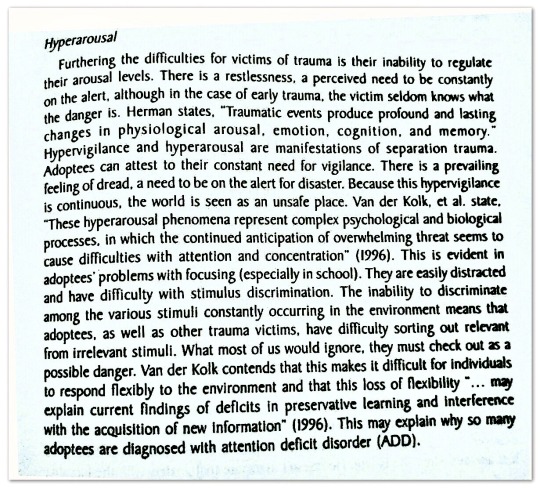
#hyperarousal#complex trauma#cptsd#narcissistic abuse#trauma#road to recovery#emotional abuse#overcoming abuse
52 notes
·
View notes
Text
starting to feel emotions again, time to up my straterra dose ?? O_o
#funny how straterra is meant to help w adhd yet i find it more helpful for#emotional regulation. especially for ppl prone to hyperarousal/panic attacks. idk what it does but#it stops my fear from going into overdrive#overdrive as in: you lose control of your body -_-#straterra has been a life saver buf noW i keep feeling anxiety again and after not feeling it for a long time im like “...”#i can deal w anxiety but no more panic attacks. those feel embarrassing to have in public :( havent had one in... a long ass time!!!#i notice my body now skips hyPERarousal n goes str8 to hyPOarousal (aka dissociation ☆_☆ ..)#slow heartbeat; floaty and numb > body on fire; everything is firing; somatic memory nightmare#txt
1 note
·
View note
Note
“Having sex is their coping tool” was a lightbulb moment for me. Sex is one of the stages of their relationship they actually have full control of the pace they go at. And it’s also the first time Katniss admits that she loves Peeta. I can really see it as their safe haven. Which is why I’m obsessed with their actual journey towards having sex. Like them actually taking it slow and learning what each other likes and getting over any insecurities both emotional and physical
Oh 100% all of that! I know that sometimes sex is used as a punchline in fandom, so I want to be clear (not to you, Non, just in general) that this is not a flippant comment by a rabid shipper. This is a serious comment by a rabid shipper, and this answer comes to you in two parts:
Part One: Science
When used in a healthy way, sex is a great coping tool. First because it's a form of connection and attachment which are vital to heal from trauma. Polyvagal theory has increased in popularity with trauma treatment because of how the body stores trauma (The Body Keeps the Score and all that) and using physical movement (walking, dancing, clapping, tapping) and physical connection (hugs, cuddles, feeling a heartbeat, eye contact, holding hands) brings the body and mind back into a regulated state. From there, processing can happen. So for partners, sex has all of that. The eye contact, the skin contact, feeling the other person's heartbeat, the rhythmic movement, and of course the oxytocin. And in terms of trauma, when in hypoarousal (numbing out, dissociation), sex moves the body up into hyperarousal (being very aware of surroundings/body) and then after the climax back into the regulated state. Or if in hyperarousal to start, a more soothing approach such as massages, slow touches, grounding through focusing on the activity, can regulate before having the climax again and going back into regulation. Obviously communication is needed for when sex is an appropriate and wanted tool, what they need from their partner in that particular moment, but there are scientific reasons for why Katniss and Peeta would find sex to help them heal and regulate their bodies following the trauma they'd been through.
Part Two: FEELS
It's implied that before "so after," Katniss had a nightmare and Peeta was there to "comfort" her. First with his arms, and "eventually his lips." And then at some point--maybe that same night his lips first comforted her, maybe many, many nights later--Katniss felt "hunger" for Peeta and she knew that they "would have happened anyway." That's the most our private, "pure" Katniss will give us, but to me it's all but canon that sex with Peeta brings Katniss comfort. That the one person who has been looking out for her the longest, her boy with the bread, is still there to guard her. That his arms hold her safe to his strong body, as they have through other numerous terrifying moments. That when she feels a hunger arise in her, he will satisfy her every single time. That each caress and stroke is a reminder that he stayed with her through the worst anybody could be put through, and he will be with her always. That what they have together in their home and in their bed, that word she'd been too scared and unsure and devastated to say before, that love is entirely real.
106 notes
·
View notes
Text
W/n; I cried way too hard making this
Sorry if the grammar is off I couldn't be bothered fixing it. 3.1K words
WARNINGS: This does have intense topics about PTSD, Trauma, etc. Please read at your own risk and all of these are just my OPINION.
Let’s talk about trauma! Before I get into this I will say this; I am not a phycologist, nor do I have proper training, this is a subject I am very passionate about and something I have studied under my own terms/things I’ve learnt from previous therapy sessions and group meetings :)
Ellie’s trauma and my opinion on it.
The first thing we will discuss is the “window of tolerance” (something I learned in therap) . Everyone has got a window of how much they can tolerate during a stressful situation or a situation with a lot of emotions. If someone is in a “hyperarousal” state that person can become aggressive, agitated, hyper vigilant, or have risky and destructive behavior, this is what we call a “fight response”. If people are in a “hypo arousal” state this is when the person can become more depressed and anxious, getting put into a “freeze response”...
Ellie’s life throughout part 1 of The Last of Us -
During the show we are met with Ellie and her mom, her mom had unfortunately been bitten and was killed soon after. This is where we are met with the first PTSD for Ellie. The first person she built “a bond” with is our mother, naturally we are very social creatures so not being able to build a bond with a parent will cause problems later on in life such as; having abandonment issues, having trouble to connect with other people because she has this fear that whoever she gets close with will die or leave her.
During the game we get to meet Marlene who was a close friend of Ellie’s mom, and had raised Ellie throughout her child-hood/early teenage-hood, this is where she got paired with Joel and Tess, in this scene is where you can see her “PSTD state” being triggered she didn’t want to go with Joel or Tess, because Marlene was someone who she created a strong bond with. Before we get introduced to Joel or Tess, Ellie had a friend called Riley who was someone she also created a bond with, Riley was someone who had joined the fireflies and escaped from FEDRA. Ellie had assumed that Riley had died from her random disappearance, Riley had then shown up to see Ellie and they went on an adventure together before Riley had left permanently to join the Fireflies, during this time Ellie had her first kiss with Riley and shared some very important moments with her. During this time infected had gotten to Ellie and Riley and bit Riley and Ellie, this was where we got to see the some-what first mentioning of Ellie’s immunity to the cordyceps- During this time of Riley and Ellie being bitten Riley had told Ellie that they should “wait it out” and “go insane together” Ellie was immune, she didn’t know that and nor did Riley, the saddest thing about the first stages of infected (called runners) is that they are aware that they are infected but they aren’t able to control themselves, so Riley had gotten infected and started turning but Ellie wasn't turning, so with that being said Ellie would’ve had to kill Riley so she wouldn’t continue to turn-
–
Joel and Tess had taken Ellie as “cargo” but obviously they all had created a bond with each other, mainly Joel with Tess as they were very close with each other. We are then met with another problem, Tess had gotten bitten and was already starting to turn, Ellie figured it out pretty quickly after Tess was acting weirdly and obviously she had created a bond with Tess so she didn’t want her to leave them/die, this is when we are met with Ellie’s PTSD, the fear of people leaving her….
Sam and Henry, she is also met with Sam and Henry who are two brothers who they met in Pittsburgh; Sam and Ellie were similar in age so they had created a strong bond with each other. Sadly Sam had gotten bitten on their journey, Sam had asked Ellie “what are you afraid of” to which Ellie replied with “of ending up alone” this is when we saw Ellie in a more vulnerable state, her PTSD side showing through more. This is when we look back to her mom, Sam, Marlene and soon enough Sam, in the show Ellie had tried to give her blood to Sam trying to save him from the infection. In the game, Ellie wasn’t aware that he was infected until Henry had asked her to go get him so they could all have breakfast, Sam had tried to jump onto Ellie to “infect her” this is when Ellie’s flight or fight had kicked in and she was trying to get him off of her, Joel had tried to kill Sam but Henry had shot near him so he wasn’t able to…. Henry in the end shot Sam, obviously upset he had then killed himself. (they really meant it when they said the last of us)
The next scene we will jump to is when Ellie and Joel had their argument about Ellie trying to run away, she had done this to avoid the pain of being abandoned again. We are met with a somewhat angry Ellie who had found out that Joel wanted to get rid of her, yet again another trauma response to her previous traumatic experiences .
When Ellie had said “I’m not her you know?” that had really hit a spot for Joel because of his past traumatic experience of losing his daughter Sarah. “I’m sorry about your daughter Joel but I have lost people to” to which joel replies with “you have no idea what loss is”
“Everyone I have cared for either died or left me, everyone fucking except for you” which is yet again another trauma response from losing her mom, Riley, Sam, Henry etc. From her point of view she is basically saying that she has somewhat formed a bond with Joel and doesn’t want him to leave, if he had left this would’ve caused some bigger problems for Ellie in her early developing stages of life.
I won’t get too much into the situation with David but a quick overview of what happened, David was someone who Ellie had met whilst trying to hunt because Joel had injured himself pretty badly and she was trying to keep him alive. David was a pedophile the easiest way to say it, during this time Ellie had gotten onto a machete and killed David, Joel then had to get her off because she was so stuck in this fight response in order to protect herself from David.
It was definitely a big time for Ellie when Joel had gone to comfort her because she was in such a vulnerable state and because he was there for her it immediately strengthened their bond together. The next scene we will talk about from The Last of Us part 1 is the giraffe scene, this is where Joel had found a giraffe and encouraged Ellie to come say hi to it which also created a stronger bond with him because it was his father figure side coming out. Once Joel had taken Ellie out of the hospital he had continued to lie to her because he needed his heart to be fixed, so to protect her from the truth that they COULD’VE made a cure he lied and said that there was a lot of other immune people and that Ellie wasn’t the only one
The last of us Part 2 - Ellie’s story
The beginning scenes we are met with Ellie listening to music and then Joel comes in to talk to her. Ellie had known from her gut and the way he was saying everything that he was lying but she also wanted the truth to come out.
Joel had played a song that is a song that Ellie will come back to a lot during her trauma and other experiences because it was him trying to continue to form a bond with her and he is basically now Ellie’s dad, so this is definitely something she will hold onto for a long time.
-
The next scene we jump to is when Joel is getting tortured by Abby and she sees this is when we see Ellie going into a dorsal/hyper-aroused state and her fight and flight instincts kick in. Her first immediate reaction to this is to fight, Nora and the other guy pin her down so she isn’t able to move putting her into a more hypo-aroused state and the only thing she can do is to shake and scream, this is also a prime example of her attachments to Joel not once in her life did she ever beg, with David she would always insult/rile the other person up but when it came to Joel this was the only time that Ellie had actually ever begged someone to not do something.
Once Abby has killed Joel (for all the people who have played the game) you can hear a lot of ringing and you're not actually able to hear anything that the other people are saying. This is a good example of the parasympathetic nervous system, Ellie was being held down and her heart rate was increasing but the body knows you are at risk of having a heart attack so it’s the body's way of calming yourself down so that doesn’t happen. This is also when her freeze response hits, it’s definitely a prime example of the “fawn” response which is when your more in a people pleasing mindset and start to accept everything for what’s happened , not to mention that this is also a PTSD response where her mind is reminding her body of what it felt like to lose somebody, her “abandonment trauma” even if he wasn’t intentionally trying to abandon her it’s still a traumatic response.
We then see Ellie on her bed sitting down whilst Tommy is knocking at her door, this is a good example of being in a hypo-aroused state which is when her body started to shut down more, accepting everything that has happened, being super brain foggy and not being able to tell the difference between reality and dream (dissociation). Another thing to note is because Ellie wasn’t able to do anything in the situation of Joel’s death she definitely entered a freeze response which is where her entire nervous system decides “hey, let’s check out” and she won’t be able to process that trauma because she’s still grieving and is still in a hypo-aroused state.
When Dina and Ellie go out across Seattle you will find a music store to which Ellie goes into and finds a guitar and starts to play the song that Joel had played to her in the beginning of the game, this is the closest thing she has to Joel still. This is what we call “resourcing”. Dina had found out that Ellie was immune and one of her responses was that “I can’t make you immune either” This is a statement that Ellie has a lot of guilt over because she isn’t able to make Dina immune.
Ellie had found another guitar and went straight to that for resourcing a way to feel closer to Joel.
Ellie’s 15th birthday
This is another very special moment for Ellie which is where she and Joel spend time together on her birthday. Ellie had found a rocket-ship simulator in a museum and her and Joel go into it and Joel pulls out a music tape which was yet again another very important moment for her as she felt super close to Joel and was in a relaxed mindset
Ellie had stumbled across a painting that has the fireflies symbol on it saying “LIARS” this is another cool example of how trauma can leak into the best memories we’ve had.
Finding and Killing Nora
This is another scene where she had some-what turned into Joel, with Ellie being in a hyper-aroused state. Where she was agitated, aggressive and wanted to hurt the person who had helped kill Joel. The scene after she had killed Nora and she was outside the building Dina and Jesse where in, she was shaking which was her flight response kicking in, she was getting ready to run away from danger to protect herself. Dina had looked after Ellie still very shaken up and crying, we hear that Ellie says “I don’t want to lose you” she genuinely meant it and she was definitely very guilty about what has happened so far, another really big bonding scene for Dina and Ellie.
The hospital scene where Ellie runs away and leaves Joel a note During this scene we get to see Ellie figuring out the truth and that Joel has been lying to her, even though she KNEW he was lying she was trying to get him to admit it.
“You don’t get to leave me a goddamn note” which is something that Joel says, Ellie then pushes him away because she’s angry and isn’t okay with the situation because she has been trying to get Joel to talk to her for so long and admit the truth. There was definitely a lot of anger and guilt on Ellie’s side because she was probably thinking about what COULD’VE happened to the world if she was given the chance to be used to help make a vaccine
When she killed Owen and Mel
This was definitely a big trauma response to when she had lost Joel going into that hyper-aroused state, fawn response and guilt, she had killed Mel who was pregnant, she was definitely thinking about Dina in that moment because Dina was pregnant and not only that but it’s also because she had killed a pregnant women (nobody likes her anyways so it doesn’t matter) and an unborn baby we see Ellie not being able to breathe correctly and the ringing in her ears again.
When Abby is about to kill Dina
This is definitely more on Abby's side of the story which is something we’ll get into if you guys want me to write up about Abby’s side of the story, Abby had been put into a flight or fight response and Ellie had said “she’s pregnant” to which Abby replied back with “good” and then Lev joins in and says “Abby” abby then looks up at Lev and Lev isn’t accepting of the situation so she pushes Dina away and chooses to let them go.
When Ellie has the panic attack at the farm
When Ellie tries to get the sheep into the barn and the lamb knocks over the farming tools we see a very faint flashback to an image of Joel getting tortured which immediately puts Ellie into a “hyper-arousal” state, she immediately starts to hyperventilate. The door closes and Ellie is immediately met with the ringing in her ears again the same ringing she heard when Joel died and killed Mel, she tried to run down the stairs and get to Joel, but the door was locked. This is a great example of what a PTSD flashback can be like, when she heard the lamb knock over those tools her mind brought her back to the traumatic experience of Joel’s death.
Now for the best part, when Ellie finds Abby tied up- Ellie’s original plan was to kill Abby and or Lev because she’s in so much pain and she’s still grieving- Throughout the game if you go into her drawing book you see that she isn’t able to draw Joel’s eyes anymore because she has “forgotten” what they look like… When Ellie sees Abby picking up Lev you can see that Ellie is then starting to realize that Abby is “Joel” and Lev is “Ellie” you can see in her eyes that she doesn’t want to kill and she is starting to forgive, when we get the last fight scene we are then met with another slight PTSD flashback of when Ellie sees the blood on her T-shirt, she immediately goes into a fight response and wants to hurt Abby for what she’s done. Ellie is starting to kill Abby by this point and we are then met with another slight flashback of Joel, with the same ringing in her ears, she was starting to go into a dissociative state again. Ellie knew at this point that if she didn’t let Abby go she probably would’ve lost Joel forever so she decided to let her go. When Ellie says “go, just take him” I don’t think she was talking about Lev in this situation but taking Joel with her so the pain will stop.
When Ellie arrives back at the farm it is shown that Dina isn’t there anymore, she immediately goes back to the guitar for resourcing and helps her nervous system calm down. The ending of the game we are met with another flash back with Joel and Ellie talking, to her this probably would’ve put some peace to her grieving still, at the very end we can see that Ellie puts Joel’s guitar down and in my opinion for Ellie this is her going; “Okay, what I’m doing isn’t working. Fighting my way out of the situation isn’t working, it’s not helping me, it’s not helping anyone. I need to let you go” and so she let him go.
In regards, I have not yet done Abby’s side of her PTSD but I will get into that if anyone would like me to and I’ll reupload it as Abby’s side and Ellies side- For anyone still wondering I do think Ellie was in the wrong, Abby had let her and Tommy live because she didn’t want to be like Joel, she didn’t want to be worse than Joel. Instead of Ellie staying and learning how to deal with her trauma she tried to get revenge on the person who had hurt her most (Abby) Ellie had killed around 150 people throughout Seattle to try to get to Abby, this is why when people have severe PTSD like Ellie it affects relationships like with Dina, Dina left in results to Ellie not working through her PTSD. Ellie had chosen revenge over Dina which is a massive sign of her PTSD and not being in a great headspace- Although, I do feel really bad for Dina, unfortunately there isn’t a lot about Dina’s backstory etc. But from what I can gather from the game Dina was constantly in a “fawn-state” where she agreed with everything Ellie had said/done because she didn’t want her to leave or whatever.
Ellie was in the wrong, Abby wasn’t :)
MY SINCERE APOLOGIES TO ANYONE WHO WAS SOBBING THROUGH THIS I WAS TOO BUT IT NEEDED TO BE TALKED ABOUT
I will tag people in the comments coz it's not working for some reason rn
#ellie imagine#ellie williams#ellie tlou#ellie williams smut#ellie williams x you#ellie x fem reader#the last of us#joel miller#joel and ellie#trauma#ptsd
46 notes
·
View notes
Text
[“One author of the Clinical Psychology Review article was Shira Maguen, a researcher who began to think about the moral burdens of warfare while counseling veterans at a PTSD clinic in Boston.
Like most Veterans Affairs psychologists, Maguen had been trained to focus on the aftershocks of fear-based trauma—IED blasts that ripped through soldiers’ Humvees, skirmishes that killed members of their unit. The link between PTSD and such “life-threat” events was firmly established. Yet in many of the cases she observed, the source of distress seemed to lie elsewhere: not in attacks by the enemy that veterans had survived, but in acts they had observed or carried out that crossed their own ethical lines.
Soldiers were not, of course, the only people who risked committing such transgressions. All of the counselors I interviewed at the Dade Correctional Institution struggled with inner conflicts related to horrifying things they’d witnessed but failed to prevent. What kind of person was she? Lovita Richardson wondered after seeing a prisoner bound to a chair get bludgeoned and not intervening to help him. “Why didn’t I do more?” Harriet Krzykowski asked herself after learning about the “shower treatment.” Many of the prison guards I’d interviewed had alluded to incidents where they’d done things they knew they shouldn’t, as when Bill Curtis slammed a man to the ground, nearly fracturing his skull. Moral injuries were an occupational hazard for anyone whose job involved “perpetrating, failing to prevent, or bearing witness to acts that transgress deeply held moral beliefs.” For most dirty workers, that is.
Among the veterans she counseled, Maguen grew particularly interested in the emotional toll of killing, which was sanctioned in the military but not when defenseless civilians were involved. “I was hearing about experiences where people killed and they thought they were making the right decision,” she told me, “and then they found out there was a family in the car.” To find out how heavy the burden of killing was, Maguen began combing through the databases in which veterans of conflicts dating back to the Vietnam War were asked if they had killed someone while in uniform. In some cases, veterans were also asked whom they killed—combatants, prisoners of war, civilians. Maguen wanted to see if there might be a relationship between taking another life and debilitating consequences like alcohol abuse, relationship problems, outbursts of violence, PTSD. The results were striking: even when controlling for different experiences in combat, she found, killing was a “significant, independent predictor of multiple mental health symptoms” and of social dysfunction.
Later, when she started directing a mental health clinic at a VA hospital in San Francisco, Maguen convened groups where veterans came together and talked about the killing they had done. In the VA no less than in the military, this was a taboo subject, so much so that clinicians often referred to it euphemistically, if at all. To ease the tension, a scene from a documentary was shown at the beginning of each session in which a veteran said, “Out there, it’s either kill or be killed. Nothing can really prepare you for war.” Afterward, Maguen would ask the veterans in the room a series of questions about how killing had impacted their lives. Some reacted angrily. Others fell silent. But many seized the opportunity to talk about experiences they later told Maguen they had never spoken about with anyone, not even their spouses and family members, for fear of being judged.
The veterans in Maguen’s groups didn’t talk a lot about fear and hyperarousal, emotions linked to PTSD. Mostly, they expressed self-condemnation and guilt. “You feel ashamed of what you did,” one said. Others described feeling unworthy of forgiveness and love. The passage of time did little to diminish the depth of these feelings, Maguen found. Geographic distance didn’t lessen them much either. Maguen recounted the story of a pilot who was haunted by the bombs he had dropped on victims far below. What troubled him was, in fact, precisely his distance from them—that instead of squaring off against the enemy in a fair fight, he had killed in a way that lacked valor. Obviously not all pilots felt this way. But the story underscored the significance of something Maguen had come to regard as more important than proximity or distance in shaping moral injury—namely, how veterans made sense of what they had done. “How you conceptualize what you did and what happened makes such a big difference,” she said. “It makes all the difference.”
Unlike PTSD, moral injury was not a medical diagnosis. It was an attempt to capture what could happen to a person’s identity and soul in the crucible of war, which is why it struck a chord among veterans who did not feel their wounds could be reduced to a medical disorder. “PTSD as a diagnosis has a tendency to depoliticize a veteran’s disquietude and turn it into a mental disorder,” observed Tyler Boudreau, a marine officer who served in Iraq and came back haunted by doubts about the war’s morality. “What’s most useful about the term ‘moral injury’ is that it takes the problem out of the hands of the mental health profession and the military and attempts to place it where it belongs—in society, in the community, and in the family—precisely where moral questions should be posed and wrangled with. It transforms ‘patients’ back into citizens and ‘diagnoses’ into dialogue.”]
eyal press, from dirty work: essential labor and the hidden toll of inequality in america, 2021
191 notes
·
View notes
Text
What is CPTSD?
This is going to be a long haul, okay? I will break this into sections so that it isn't so much to take in at once. When you see (☆☆☆☆) it means there is a break in information, and you can step away if need be, without getting lost.
⚠️TRIGGER WARNING: READ AT OWN DECRETION⚠️
!!This should in no way be used as a diagnosis!!
Where It All Begins:
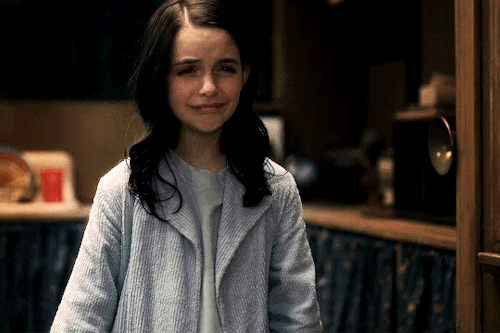
People diagnosed with Complex Post Traumatic Stress Disorder (C-PTSD or CPTSD) are often victims of prolonged childhood trauma that questions their sense of security and of self (Davis, 2019), usually spanning months if not years. This could be a result of emotional, physical, or mental abuse; sexual abuse; domestic violence; growing up in a war zone or being held captive; or human trafficking; among others. This trauma stops the part of your brain that regulates emotion, the amygdala, from growing as it should, stunting its growth at only 80% of its true size (Garrett, 2019). The growth of the children's brain is also damaged because the child's neurological and psychological development, leaving the function of their brain permanently damaged for the rest of their life. Because of this it is considered a Developmental Trauma Disorder, or DTD, because the effects aren't usually seen until later in life, after the child can escape the traumatic situation. Often, children that have experienced these traumas can be classified as ACEs, or as experiencing Adverse Childhood Experiences.
CPTSD is not acknowledged in the Diagnostic and Statistical Manual of Mental Disorders Five (DSM-V or DSM-5), but rather grouped together with standard Post Traumatic Stress Disorder. Because of this error, Complex PTSD isn't accepted as its own stand-alone disorder and most do not get diagnosed with it unless psychologists/psychiatrists accept it as its own disorder (Davis, 2019). This, however, can be very detrimental to those who actually have the disorder, since the symptoms of CPTSD are much more severe than those of PTSD (Garret, 2019).
☆☆☆☆
Physical Symptoms of CPTSD:
Some of these are symptoms I personally have and others are ones I have read about/researched:
Shrinkage of amygdala
Risk of developing immune issues, diabetes, and heart diseases in the future
Increased heart rate
Increased levels of adrenaline which causes shaking and high blood pressure
Headaches and/or migraines
Talking way too fast
Loosing large chunks of time throughout the day for no reason
Chronic fatigue
Sleeping with hands on/around your neck or touching your neck excessively
Insomnia
Slower reaction time
Heart arrhythmias
Raise in body temperature
Worsening of PMS symptoms
No energy
Overreactive nerves
Hyper senses
Auditory processing problems
Emotional/Mental Symptoms of CPTSD:
Some of these are symptoms I personally have and others are ones I have read about/researched:
Compartmentalizing way too well
Wonder if you manipulate people to love you/feeling like you are genuinely unlovable
Feeling unreal
Too good at adjusting to new circumstances/can make a home in the worst situations and have no problem with it
The irrational side and rational side of yourself constantly fighting (knowing you are freaking out over nothing but being unable to stop it)
Hypersensitivity
Unexplainable feeling of doom/dying early
A. Lot. Of. Anger. And. Barely. Contained. Rage.
Good in a crisis, only to fall apart later and/or over little things
A delayed grief process (mostly due to being unable to regulate your emotions well)
Basic inability to control emotions (aka light switch emotions)
Extremely violent intrusive thoughts
Somatic/emotional flashbacks (unlike PTSD, there is not a visual component to these flashbacks)
Imagining yourself in horrible situations where you get all the sympathy (side effect of not being loved enough as a child)
Extreme attachment issues on both sides of the spectrum (isolation and clinging)
Feels like no one knows you truly/don't trust anyone/can't tell people how they feel
Think is only extremes
Triggers
Manic/depressive episodes
Obsessive need for revenge
Hypo/Hyper sexualizing yourself
Mistaking hypervigilance for being an empath
Associating unrelated things to trauma
Little to no memory of childhood/time before trauma
ADD/ADHD
Other mental illnesses including depression, anxiety, maladaptive daydreaming, age regression, suicidal thoughts, borderline personality disorder, dissociative disorders, somatization disorder, etc.
Loss of hope/inability to feel hope
Easily over-stimulated
Chronic nightmares/night terrors
Warped sense of self
Hyperarousal (easily startled)
Downplaying everything
Feeling like you are never enough for others/constantly trying to prove that you are (aka overcompensating)
Panic attacks/anxiety attacks
Miscellaneous:
Some of these are symptoms I personally have and others are ones I have read about/researched:
Problems with religious beliefs/faith
Feeling as if there is a gaping hole physically in the center of your chest, often agonizing
Often imagines a little child hiding within your skin/beside you watching at all times
Very good with/kind to/understanding of children and strangers
Imagining scenarios at night to calm yourself enough to fall asleep
No tight clothes
Things can't touch your neck
People can't stand behind you
Rewatching/rereading movies/TV shows/books repeatedly
Psychoanalyze everyone you meet
Extremely careless with own life but extremely protective over anyone else's, especially those you care for
Grew up way too fast
Looks for a hero/rescuerer/parental role to fulfill for friends
Likes sour or spicy food
Hating competition
Feeling intense jealousy over those who got help
Hating intimacy (emotional or physical)
Drawn towards hard sciences/mental sciences
Intense need to be loved but hating it/not looking for it
Hard time communicating
The profound sense that you are okay with being the villain and you may even strive to be one (and not in the cute 'I'd love to be Loki way',, but rather completely fine with betraying/hurting/killing others)
Sitting on the floor of your shower because you can't even imagine standing up
Having a problem with authority, either by hating it and acting out or being terrified of it
Addictive personality
Never let yourself stop moving long enough to be in your own head/too scared to allow yourself to think
☆☆☆☆
Healing from CPTSD:
You cannot escape flashbacks until you deal with your trauma head on. I will tell you right now I have been healing from mine for 3 years and I'm not even halfway done. Just be patient. You have to rewire your entire brain all over again. It's going to be hard because those with CPTSD have no 'model' for what it's like (Garrett, 2019), but you've got this. I believe it you <3
Participate in self care
Heal your inner child (I do this by doing thing I never did as a child. I jump on my bed. I have dance parties alone in my room. I sneak snacks at midnight. I run with my arms wide and wave them like airplane wings. Whatever your healing looks like, do it)
Trauma-informed therapy
Behavioral therapy
☆☆☆☆
Resources For You:
SAMHSA's National Helpline: 1-800-662-4537
NAMI Helpline: 1-800-950-6264
NIMH Helpline: 866-615-6464
Mental Health America Hotline: text MHA to 741741
Crisis Text Line: text CONNECT to 741741
National Suicide Hotline: 988
☆☆☆☆
Works Cited:
https://cptsdfoundation.org/2019/09/03/what-is-complex-post-traumatic-stress-disorder-cptsd/
https://www.psychalive.org/injured-not-broken-why-its-so-hard-to-know-you-have-cptsd/
https://themighty.com/topic/post-traumatic-stress-disorder-ptsd/habits-living-with-complex-ptsd
☆☆☆☆
Quizzes:
THESE ARE NOT DIAGNOSTIC TESTS. DO NOT TAKE THE RESULTS OF THESE QUIZZES AS A SURE-SIGN THAT YOU HAVE CPTSD
Mind Diagnosis
D'Amore Mental Health
Main post can be found here.
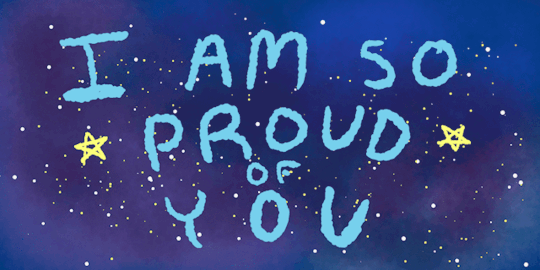
#complex ptsd#cptsdsupport#cptsd tag#cptsd recovery#childhood trauma#inner child#healing#trauma recovery#generational trauma#trauma#mental illness#mental support#mental disorder#ptsd#complex post traumatic stress disorder
513 notes
·
View notes
Text
10 reasons why Carter is a victim and isn’t a villain:
* He told JP he was the victim of conversion therapy as a teenager. JP expressed sympathy but did not suggest he seek therapy or the help of a mental health professional, despite observing Carter is now in his 30s (at least?) and is still actively affected and influenced by this trauma from his childhood.
* Carter actively displays many symptoms of PTSD (post-traumatic stress disorder), a majority of which JP notices after learning of Carter’s difficult past - some of the symptoms Carter displays are avoidance and emotional numbing (a workaholic, seldom not working or out of a suit and tie, avoids talking or even looking at and being near JP so as not to acknowledge his feelings for him), is isolated (has no friends) and is withdrawn (he never socialises unless it’s for work - e.g he only goes to a social night at the dog to have a “quiet word with Tony” about councellor business and not to enjoy himself or socialise), hyperarousal (irritable, angry outbursts, difficulty concentrating - such as when JP has to shout at him twice to make him notice he’s even there) and self harming and destructive behaviour (binge drinking, painkillers, snapping an elastic on his wrist when he has thoughts he doesn’t want to have)
* Carter tells JP that Freya can never know his sexuality and why his relationship with her mother didn’t work. Several minutes later JP is strutting after Freya to tell her what the conversation she nearly walked in on was really about, completely ignoring Carter’s wishes. Carter has to chase him to try and stop him, terrified he’s going to out him to his daughter.
* JP repeatedly encourages Carter to come out, embrace his sexuality and engage in their relationship despite Carter expressing reluctance and disagreement. JP even tells Carter he won’t out him and then tells his mum everything, who then meets Carter at their party and passive aggressively threatens him not to hurt her boy which makes Carter so uncomfortable he has to leave the party early.
* JP again promises not to out Carter and then invites himself into Carter’s flat when the door is open, talking loudly about how he wants to kiss Carter and make love to him, whilst not even checking the flat is empty.
* The scene the morning after Declan subjects Carter to conversion therapy is hugely disturbing - JP has to shout at him to get his attention because Carter is so disassociated, he’s limping and looks exhausted and JP is more interested in demanding his job back. Carter telling him he’s been “punished for it in more ways than you can possibly imagine” also fails to alert JP that Carter is in considerable distress and needs help, despite also having an angry outburst at him which shocks JP but seemingly doesn’t concern him.
* JP approaches Carter by the pond to discuss if their relationship is going to happen. Carter quietly tells him he’d rather not have the conversation in public. JP says he respects that but proceeds to have it anyway saying he wants to know where he stands. Not long after that, Carter has an angry outburst at him referencing God and the bible and seems distressed - JP fails to recognise any issue and instead tells him that he doesn’t need to hear this and walks away. Not before telling Carter he’s brainwashed, but seemingly doesn’t think that could require any professional help to put right…
* When Carter confronts JP after JP has outed him to Maxine in the flat, JP says he didn’t mean her to hear but doesn’t regret her knowing the truth. Effectively saying he’s not sorry for outing Carter - nice! He then tells Carter he has no idea why he’s treating him so badly to which Carter has to explain it’s because he broke his promise not to out him. Like it’s rocket science…
* At the work christmas party, Carter is clearly drunk and passes out. JP presumably helps him to his own place where he says prescription painkillers fell out of his pocket. So JP let someone on pills and alcohol just pass out all night long on his bed on his back? His breathing could have been dangerously suppressed. He could have choked on his own vomit. He might not have woken up? Least of all are we to assume JP took off his shirt and undressed him for sleep? Seems… inappropriate considering he knows Carter is private and deeply suppressed, and also passed out drunk.
* The morning after the party, JP also again asks Carter to let him help him and fails to suggest it would be better to seek out the help of a professional at this point.
I mean, I could go on. There may be a part 2, I probably have enough notes for a part 3 really.
10 notes
·
View notes
Note
Do you have any tips for deprogramming, specifically fighting against silencing programs? We’ve reached a weird part where it seems like it’s impossible to continue and we can’t see a way forward with how to fight against the physical silencing that’s happening.
🗝️🏷️ RAMCOA, programming and deprogramming
It depends on how urgently you need to get around it. Undoing the silence is different than squeezing past it, and both have their place in the process.
We often spend some time decompressing, abiding by the silence. This lets the one(s) who enforce the program calm down a bit, get out of the hyperarousal state that keeps them activating it.
When they’re less jumpy, we can ask what happened to turn on the silence. Usually it’s something we did, internally getting too close to blocked memories or externally disclosing information the system wasn’t ready to. Sometimes it’s environmental, someone inside getting triggered by similarities to trauma time or current contact by abusers.
Once you know how the silence was brought on, you can negotiate with enforcers to turn it down or off. Let them know about your external life, how it’s become safer with distance or deprogramming. Talk about your values, and why this program doesn’t align with those values. Encourage them to take part in daily living, eventually giving them the option to breakaway from rules they were given.
If it’s taking too long — because you’re in danger or have reason to disclose right now, not because cooperation is difficult — ask them whether you could write instead, or draw, or talk to someone outside you can demonstrate is safe.
They’re likely to be fearful, and their fear may be mixed with anger or shame or dependence. They might not want to communicate at first, and it’s up to you to show up anyway. Present stability, acceptance, and care. It’s okay if you have other emotions, too, but you should process those away from them; it’s like external children, they’re dependent on you now, not the other way around.
Some of them might be able to build reciprocity, but others are likely developmentally young and/or heavily traumatized. They need support before they can give it.
You might all be at a similar stage of needing more than you can give. If that’s true, different insiders can take turns giving and receiving. You can make it circular — leaving out the ones who can’t give at all — where each of you tends to someone and has someone to tend to you.
We like to do the support circles with our subgroups first, then have groups arrange themselves into support circles.
There might be a few insiders who can take on more caregiving, and they might be partnered with others who can’t do any caregiving. Both ends of the partnerships should try to fit into circles to some extent, and the circles should gain nodes and connections to resemble more of a support network than just two lines of communication for everyone.
Building those support networks allows for more relationships in the system, and those receiving support will begin to branch out with time. They’re simultaneously getting care and learning to interact healthily with other system members, and those two things facilitate deprogramming better than any intervention we’ve tried. Changing programmed behavior comes naturally once you have internal community.
You also mentioned physicality, which might mean you have to work through the memories that manifest symptoms in your body. Memory work is about the last stage of deprogramming (with resolution as the true finale), and insiders changing behaviors can stop the somatic symptoms.
If insiders agree to make a program stop, you might have to put away memories before you can process them. We use boxes to assemble memories and books to store them, and you might already have an archive of sorts where programs are stored. You can use any method that works for you, but with the understanding that the memories will have to be processed eventually.
Memories that sit too long might leak, and memories with missing pieces often resurface as flashbacks while your brain tries to integrate them into storage.
Completing the whole task takes time. Start with giving space and inquiring about cause, then move to negotiation. Once the silence is less of a problem, you can figure out why the program exists and work through the training memories. Either way, you’ll get there, and you should celebrate every step of the way.
8 notes
·
View notes
Text
For decades, the standard therapy proffered to victims of disaster—terrorist attack, combat, severe burn injury—was the “psychological debriefing.” A therapist would invite victims of a tragedy into a group session in which participants were encouraged to “process” their negative emotions, learned to recognize the symptoms of post-traumatic stress disorder (PTSD), and discouraged from discontinuing therapy. Study after study has shown that this bare-bones process is sufficient to make PTSD symptoms worse.
Well-meaning therapists often act as though talking through your problems with a professional is good for everyone. That isn’t so. Nor is it the case that as long as the therapist is following protocols, and has good intentions, the patient is bound to get better.
Any intervention potent enough to cure is also powerful enough to hurt. Therapy is no benign folk remedy. It can provide relief. It can also deliver unintended harm and does so in up to 20 percent of patients.
Therapy can lead a client to understand herself as sick and rearrange her self-understanding around a diagnosis. Therapy can encourage family estrangement—coming to realize that it’s all Mom’s fault and you never want to see her again. Therapy can exacerbate marital stress, compromise a patient’s resilience, render a patient more traumatized, more depressed, and undermine her self-efficacy so she’s less able to turn her life around. Therapy may lead a patient by degrees—sunk into a leather sofa, well-placed tissue box close at hand—to become overly dependent on her therapist.
This is true even for adults, who in general are much less easily led by other adults. These iatrogenic effects pose at least as great a risk, and likely much more, to children.
Police officers who responded to a plane crash and then underwent debriefing sessions exhibited more disaster-related hyperarousal symptoms eighteen months later than those who did not receive the treatment. Burn victims exhibited more anxiety after therapy than those left untreated. Breast cancer patients have left peer support groups feeling worse about their condition than those who opted out. And counseling sessions for normal bereavement often make it harder, not easier, for mourners to recover from loss. Some people who say they “just don’t want to talk about it” know better than the experts what will help them: spending time with family; exercising; putting one foot in front of the other; gradually adjusting to the loss.
When it comes to our psyches, we’re a lot more bespoke than mental health professionals often acknowledge or allow. And Tuesdays at four p.m. may not be when we’re ready to confront our woes with a hired expert. Reminiscing with a friend, cracking a joke with your spouse you wouldn’t dare make with anyone else, helping your cousin box up her apartment—without talking about your problems—often aids recovery far more than sitting around in a room full of sad people. Therapy can hijack our normal processes of resilience, interrupting our psyche’s ability to heal itself, in its own way, at its own time.
Think of it this way: group therapy for those who experienced loss or disaster forces the coping to hang out with the sad. This may make the relatively resilient sadder and prompt the sad to stew. The most dejected steer the ship to Planet Misery, with everyone else trapped inside.
Individual therapy can intensify bad feelings, too. Psychiatrist Samantha Boardman wrote candidly about a patient who quit therapy after a few weeks of treatment. “All we do is talk about the bad stuff in my life,” the patient told Boardman. “I sit in your office and complain for 45 minutes straight. Even if I am having a good day, coming here makes me think about all the negative things.” Reading that, I remembered saving up emotional injuries to report to my therapist so that we would have something to talk about at our session—injuries I might have just let go.
Interestingly, even when patients’ symptoms are made objectively worse by therapy, they tend to assume the therapy has helped. We rely largely on how “purged” we feel when we leave a therapist’s office to justify our sense that the therapy is working. We rarely track objective markers, for example, the state of our career or relationships, before reaching a conclusion. Sometimes when our lives do improve, it’s not because the therapy worked but because the motivation that led us to start therapy also led us to make other positive changes: spend more time with friends and family, reconnect with people we haven’t heard from in a while, volunteer, eat better, exercise.
An embarrassing number of psychological interventions have little proven efficacy. They have nonetheless been applied with great élan to children and adolescents.
-- Abigail Shrier, Bad Therapy
7 notes
·
View notes
Note
Can you have complex PTSD if you've only had one traumatic event in your life? I am asking this because it happend to me in my childhood and I don't remember it. I only know it is real because of nightmares
I find it difficult and not appropriate for me to give you a clear answer on that question. Trauma occurrence in childhood is difficult because it can have an impact on childhood development and there is a lack of memory in a lot of cases.
I'd caution from self diagnosing but it may help you to look at the symptoms. Ptsd occurs in 3 clusters (hypervigilance/hyperarousal, intrusion, avoidance and numbing). Complex ptsd is more severe in its symptoms (emotional regulation, severe self-esteem issues and negativ self-beliefs, difficulty in navigating relationships etc.).
42 notes
·
View notes
Text
idk if anyone else has said it yet, but i’m feeling bitter right now, so i will (also it’s just always bothered me)
has anyone else ever noticed the difference in fan opinions between Michael and Vanessa?
in many ways, they are VERY similar characters.
they’re both night guards, have been fucked over by William, killed kids, and barely actually show up in the games.
however, Michael is treated like a goddamn king by the fandom, while Vanessa barely gets scraps. she’s regarded as a bitch so often, is hated on constantly, and/or is sometimes flat out ignored or erased from stories entirely.
oh no! a woman is grumpy! she MUST be a bitch!
Vanessa isn’t a bitch. she’s an underpaid security guard that has her entire career on the line throughout the whole game. there’s a loose child in the Pizzaplex. she’s literally trying to do her damn job so she won’t get fired.
more than that, Vanessa is clearly under a severe amount of psychological stress. she’s being mind controlled by a serial child killer to murder people. you’re telling me you also wouldn’t be in a constant bad mood if that was your life?? and even if you don’t think Vanessa is Vanny, Vanessa STILL has mental health issues. that much is proven by the therapy tapes (i think it’s canon that she has depression and anxiety? and maybe PTSD? i can’t remember; it’s been awhile since i was hyperfixated on this game). god forbid a person, a woman no less, shows the negative aspects of their mental illness!
like, depression, anxiety, AND PTSD all cause irritability and anger issues. anxiety literally triggers your fight or flight, and not everyone automatically cowers into their flight instinct. PTSD has a little something called “hyperarousal,” which is a constant state of anger.
but okay, mental health issues can’t be used as an excuse for things, alright. it’s still late at night. people get irritable and cranky the more they stay up. lack of sleep causes aggression.
but really, none of that matters because Vanessa is justified in her grouchiness through the entire game since, again, she’s doing her job.
and it’s not even like she says or does anything that bad! i’ve seen people treat her like she’s some kind of monster, and for what? because she made a hollow threat about scrapping Freddy?? it was, like, two in the morning, people! people say things they don’t mean when they’re 1) tired and 2) emotional. and we all know she doesn’t have the authority to do that, so she wouldn’t actually go through with it.
also need i remind everyone that Vanessa is treated poorly by her OWN CREATOR?? she’s grossly sexualized. we all know what the Vanny suit looks like. it’s skintight. it’s very obviously designed in a way to highlight ALL her curves. Scott did that on purpose. and like,,, why?? she’s a murder bunny. why does she have to be “attractive”?
don’t get me wrong, i like the design for Vanny, i just hate the suit. i love the idea of her looking all patchwork, like Vanessa tore apart different articles of clothing to make the costume because she couldn’t get enough fur, so she could have been this big mess of thick white fur with splashes of a bunch of random materials in between the pelt. that could have easily shown how, like, “unpracticed” she is. it’s a shoddy suit made by someone who doesn’t know what they’re doing.
but NOOOO, Scott had to go, “how can i show that she’s a woman who has boobs?!?!??!? how can i bring her boobs into this?!?!?! what about her boobs?!?!?! we can’t forget about her boobs!!!!”
like, dude, we know she has boobs. she’s a killer bunny, not a playboy bunny. let’s not blur the lines, Scott.
you know, it’s really saying something when the plush of a character is less sexualized than the design itself. i own a Vanny plush (it look, like, three months for her to ship), and she looks great! she’s super cute! but, GOD, the DUALITY between her and the actual Vanny is GLARING.
but also, this isn’t anything new. most of Scott’s female characters get the treatment of being sexualized.
it’s just so goddamn frustrating to see male characters get held up on a higher pedestal than female characters. this is an issue in most fandoms. the women are treated like shit. and it’s infuriating.
just— if Vanessa were a guy, people would NOT treat her the way they do. and if she were a man, Vanny’s suit would have been less sexualized and more like an actual animal suit.
#i have. many thoughts#defending vanessa on the internet takes too much effort. i need a gun#she deserves better than what she gets#and i will defend her until the day i die#fnaf#fnaf security breach#five nights at freddy’s security breach#five nights at freddy's#fnaf vanessa#fnaf vanny#fnaf micheal#michael afton
70 notes
·
View notes
Text
Canon vs. Fanon #3: All Might has depression/PTSD

Part 3 of comparing canon to fanon! This one’s long. Previous posts are about Quirklessness and Toshinori’s appearance. The appearance one is slightly relevant here.
This one is... absolutely fascinating to me. This assertion is “unspoken canon” among a lot of All Might fans. It was for me, too, for a long while. There’s plenty of reason for him to have pretty severe mental health problems, considering everything he’s been through. I mean, just look at him.
But... things didn’t quite add up for me. So this post examines what got me into this idea, then what made me decide that it, ultimately, didn’t really fit him the way I once thought it did.
Big huge disclaimer: I’m not a medical professional, and I’m not trying to claim that my interpretations of the show are any more valid than anyone else’s. I’m not trying to “prove” any “facts.” This is just an embarrassing amount of speculation, personal musing, and gushing about my favorite character.
In real life, mental health issues manifest in many ways; they can be subtle, masked, or look nothing like “textbook” examples. This is not meant to be an analysis of mental illness: it’s an analysis of fictional depictions of mental illness. When an author is trying to signal “Look, it’s PTSD! Look, it’s depression!” they will often insert certain predictable symptoms to clue the audience in. That’s really the deepest anyone can go with this kind of character analysis. All we can do is take a look at the behaviors and thoughts we are given, look at the context, and go, “Does this seem close to what we might expect?” This is obviously subjective and full of personal opinion, and it’s not meant to be commentary on real life or an attack on anyone’s personal experiences with these conditions.
Lastly, fanworks aren’t obligated to follow canon or author intent, whatever it may be, because fanworks are quite literally all about exploring what canon doesn’t. In the end, we’re all just finding meaning in characters we love. Tons of people (myself included) find meaning in labeling All Might as traumatized or depressed, and that’s all the justification it needs.
Does he have PTSD?
Going to get this topic out of the way first because I feel like it’s pretty clear-cut by comparison. It makes sense to assume Toshinori might suffer from PTSD. You do hero work as long as he has, you’re sure to see some awful, haunting things. He recently survived a horrific injury and repeated revision surgeries.
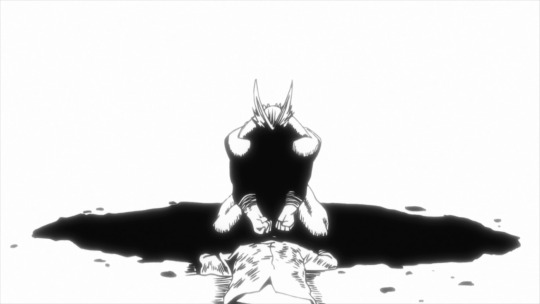
But... as far as I can see, his canon mannerisms don’t seem to contain any of the usual markers that generally signal “look, it’s PTSD!” such as flashbacks, nightmares, hyperarousal, reactions to loud noises, or intrusive thoughts. The strongest anxiety reaction we ever see from him is his reaction to Gran Torino! (Which, by the way, I will always assert was played up by the narrative for funny points.)
This is the case both in specific reactions and in his overall demeanor. To me, he overwhelmingly comes off as comfortable in his own skin and in control of his emotions. Even when he’s describing the most harrowing fight of his life, or the death of his master, he stays composed. When a drone suddenly zooms up behind him and nearly hits him, he does not startle whatsoever... he just calmly snatches it out of the air like a badass.
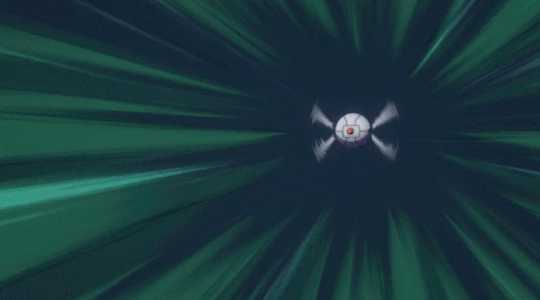
We never see him freeze up under stress. We never see him anxiously overreact or mistake friend for foe. There are several mentions about having nightmares from the terrible fight with All For One that put a hole in him... but AFO is the one complaining about having nightmares, not Toshinori!
I did find this amusing set of panels, but I have a feeling anyone would react this way to having a door suddenly slammed open behind them in the middle of a quiet, dramatic conversation.

We could claim, “well, maybe he just has episodes offscreen. Maybe he’s getting treatment offscreen.” Sure, but we could also claim that maybe he likes to wear fursuits offscreen too. That kind of unfounded speculation is the definition of fanon.
Speaking of speculation, here’s mine: I think it’s perfectly plausible that he’s dealt with PTSD symptoms in the past. But I also think that, considering his immense duties as a hero, he would do everything in his power to immediately seek professional help and treat his symptoms. His Quirk can level city blocks with the flick of a finger. It would only take one wrong move during a night terror, flashback, or accidental overreaction to cause a national tragedy. I cannot imagine he would just sit around and go “welp, I don’t want to see a therapist because Secrets, guess I’m just traumatized forever.” For all his flaws, I think he’s more responsible and caring than that, plus he is a perfectionist and hates anything that interferes with his hero duties. He has an enormous budget, plus the support and coverup abilities of the national government on his side... he could find a way.
All in all... I just don’t see much canonical evidence that he has a condition like PTSD during the events of the show. I don’t see symptoms or treatments. If you think I missed something, please let me know.
Does he have depression?
Okay, welcome to the other 90% of this post.
When we first see Toshinori’s true form, the whiplash is overwhelming. He goes from a blustering, grinning showoff to someone who looks morose, tired, and resigned. Then he says these lines:
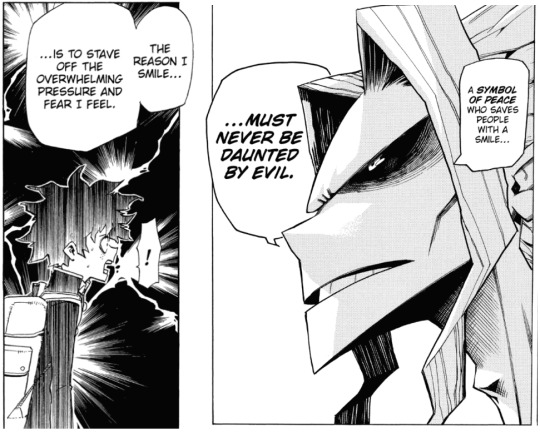
...Whoa. He doesn’t smile genuinely, he only does it as a ruse. His confident front is just a facade, hiding overwhelming pressure and fear. But he must act strong, because it’s his duty. Even if he’s crumbling inside, he can’t reveal his true emotions. It must be symbolic: his emotional “true form” must be just as exhausted and withered as his physical one. What a fascinating, relatable way to represent how depression quietly wears a person down, until they’re emotionally hanging on by a thread and can only spend a few hours a day performing normalcy until they have to sneak off and revert to their burned-out true form.

Look at him wildly overacting to put on a strong front for the kid that he wants to inspire. Such sacrifi-

Um. Anyway, one of these days, the facade will fall, and we’ll get to see the true depths of the bleak, overwhelming depression that he feels such a need to bravely hide...

Hm. This is perplexing.
Now, even severely depressed people don’t just cry nonstop. They can drag themselves out of bed and stumble through the numb haze to do what has to be done. They can fake enthusiasm. They can also legitimately feel inspired by things, or laugh at jokes, or get wrapped up in a fun activity for a time. There are periods of normalcy, scattered in between the long swaths of gray.
So when we ask whether or not a character has depression, we shouldn’t be asking, “why can they smile and function,” but where are their swaths of gray? Where, in the series, do we see them experience bone-crushing fatigue, suffocating sadness and guilt, fixation on past failures, numbness and loss of pleasure in the things they once loved? Depression is a serious mood disorder which impacts how a person thinks, feels, and behaves. Yes, Toshinori has to intentionally fix a smile on his face when performing a hero persona that smiles nonstop. Does this mean he has a mental illness?
I’m going to go through a handful of behaviors and attitudes common to depression, and compare them to what we see from him. We can’t know a person’s inner thoughts 24/7, but something as serious as mental illness tends to leave signs.
(Note that I’m going to address the war arc in a separate section, after all this.)
Behaviors: Lack of energy/motivation
One of the most debilitating parts of depression is that it saps a person’s energy and motivation. It feels like constantly wading knee-deep through mud. Even mundane tasks become difficult and draining.
Behaviorally, this can manifest in all sorts of ways, but people often begin cutting back to the bare minimum essential tasks. It’s difficult to do even the necessities, much less any “extras.” They may stop engaging in leisure activities or hanging out with friends. They can begin missing deadlines or falling behind on work.
In Vigilantes chapter 6+ beta, set several years before the series, we do see an example of Toshinori falling behind on work:
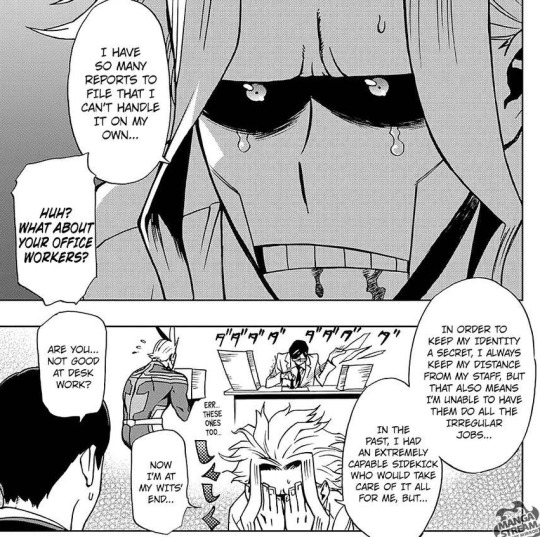
But I would seriously question this as an example of depression-fueled fatigue. Immediately prior to this, we watched him catch a purse-snatcher, stop a hit-and-run, defeat a rampaging robot, prop up a falling bridge, and save a kitten from a tree, all within minutes of each other. The implication just seems to be that he is a workaholic maniac who would generate too many reports for himself no matter what.
Aside from this... I think there’s very little evidence that he lacks energy. At the start of the main series, Toshinori can only physically do hero work for 3 hours a day. And, to our knowledge, he always does so. (Even on his days off... which is what triggers the events of the show!) If you’re using Vigilantes canon, he is also working as his own secretary at the same time. Then he takes on Izuku’s training on top of this. Through the short training montage, we always see him with Izuku at the beach, even when he has nothing to do but cheer &/or heckle from the sidelines. We do see him briefly riding on a Segway, which could have indicated a need to conserve his energy if not for the fact that he dismounts after about five seconds in order to unnecessarily transform into his hero form and shake his successor around like a rag doll.

Then, he also starts working at U.A., a task which requires him to learn huge amounts of new information and integrate into a whole new environment. How does he cope? In the light novels, he goes out for drinks with the U.A. teachers to socialize. He repeatedly jumps to contribute more than necessary, such as when he pesters Aizawa to alter a rescue exercise so he can appear as a villain. In another rescue exercise (depicted in the light novels), he even appears as a villain in his true form—trying to contribute even when he doesn’t have All Might time. (He really seems to like playing villains...) The one time he misses class (USJ) it’s because he spent too much time doing hero work, and he still goes to the effort to show up at the end even though he only has 10 minutes of hero form time left.
Aside from the purely physical limitations caused by his injury, Toshinori has never indicated that he feels drained by his ridiculously demanding lifestyle. In fact, the narration emphasizes repeatedly, like here in chapter 15, that his problem is that he refuses to cut back. And it’s not “you work too hard for an old person with an awful injury.” It’s “you work too hard compared to any human being, holy shit, calm down.” He is always pushing himself to his limits.
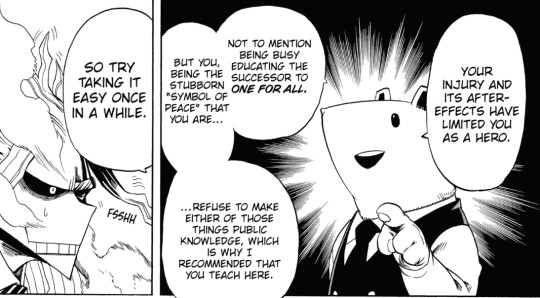
What about motivation? He clearly has enough motivation to get all of his work done, as we’ve seen. But one of the chief reasons that Toshinori decided to train Izuku is because Izuku gave him motivation to act. This could be interpreted to mean that, before meeting Izuku, Toshinori had lost the drive to do his work.
But think about the rest of the story. We just discussed how Toshinori pushes himself to his limits. In this case, the action he found motivation to do was to push past his limits and start spitting blood. That’s a dangerous thing to aspire to, and the story tells us so. Throughout the narrative, we explore the harms of this overzealous self-sacrifice, both as it applies to him, and and as it applies to Izuku, who tries to imitate him.
It wasn’t that he was unmotivated to do hero work at all before meeting Izuku—he clearly was, as shown by the fact that he had already used up all his hero form time on his day off. He was just less motivated to go beyond reason in the process.

Toshinori’s problem has never been a lack of passion—it’s been that he has too much of it, and pushes himself way too hard as a result. Far from needing motivation to act, he is constantly told he needs rest. If Toshinori has depression, it is definitely not hampering his ability to get things done.
Behaviors: Isolation
People with depression often stop hanging out with friends, stop going out to events, and generally withdraw. This does not fit at all with the Toshinori we see in the series. Once the show kicks off, he’s more social than he’s ever been, juggling hero work, Izuku’s training, teaching, and socializing with his new coworkers. Even after the events of Kamino, when he would have plenty of justification to spend several days (or weeks) recuperating and processing his loss of One For All in solitude, he leaps out of his hospital bed within a day to make appearances on national television and punch his successor in the face.
What about how he seems to have no family or friends? He mentions in Vigilantes chapter 6+ beta that he has very few friends that he can exchange personal contact info with, presumably because of his high-profile existence. The isolation of being a public figure is definitely real.

But this post points out that, throughout his career, it seems like he deliberately chose to isolate himself, even when he had no need to. He simply seemed to prefer spending his free time saving people from crime rather than dating, networking, or hanging out with buddies on the weekends. Could this have been some kind of defensive trauma response? Maybe, or it could’ve been that he simply got more fulfillment from his work than from making lots of friends or starting a family. Plenty of people (and a lot of high achievers) do not consider social life to be the pinnacle of their existence. This does not mean they are mentally ill.
In any case, he’s certainly not isolating from people during the main series—in fact, we see more named relationships of his (Nana, Gran Torino, David Shield, Nighteye, Tsukauchi) than most other heroes in the show get.
Behaviors: Sleep/appetite/pain/etc
The one time we see Toshinori apparently having trouble sleeping is in episode 101, when Nezu gently calls him out for spending way too much time compiling information on past OFA users. I’d argue that this seems more related to his obsessive research than to the somatic effects of a mood disorder. (Again with the boundless drive to get things done—something not usually seen in depression.)
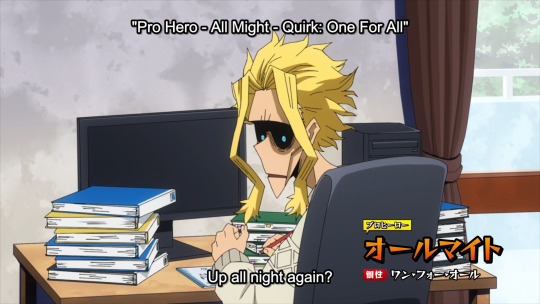
Other than this, we don’t see enough of Toshinori’s day-to-day life to have much insight on whether he suffers from sleep disturbances, appetite changes, unexplained pain, or the other physical symptoms that often accompany depression. Even if we did see these things, they could just be side-effects of his injury.
Speaking of his injury, it’s remarkable how few side-effects we are shown. I think it’s common to go, “Well, I am pretty sure that this injury should have a ton of side-effects and significantly impact his day-to-day life, and we don’t see that. Conclusion: these side-effects are there, but the show just doesn’t want to spend time showing them. In the same way, I think he has depression, but the show just isn’t directly showing it.” Hold that thought; I’ll address it later.
Depression isn’t just characterized by physical issues... it’s a mental disorder, after all. It tends to change a person’s thought patterns and pigeonhole them into predictable mindsets. So, let’s go through a few common ones and see how they compare to the way he acts.
Mindsets: Negativity/catastrophizing
Depression tends to blinker people. Under its influence, it’s very hard to see anything besides the negative sides of a situation. It makes people jump to the conclusion that things will probably go as badly as they possibly can.
This is... the absolute polar opposite of the way we see Toshinori act and think.
Two days into the school year, class 1-A is attacked by villains at the USJ. This event was a horrific disaster for Toshinori. He failed in his teaching duties by using up his muscle form and not arriving on time, and nearly lost his entire class and his coworker because of it. His time limit was massacred: he’s still supposed to be teaching and doing hero work and now he only has an hour per day to do it. Meanwhile, his successor still can’t use One For All without pulverizing his bones to dust.
How does he react?
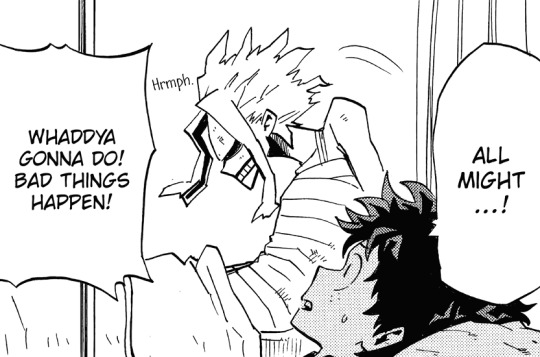
Another example: Kamino. His true form was exposed to the world. His Quirk is finally gone forever, and his hopes for a smooth succession are ruined. Society is sure to destabilize from this, and villains are going to grow bolder than ever in a time when there is now no one strong enough to stand against them. How does he respond?
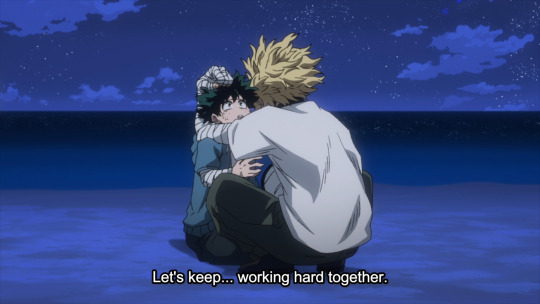
Okay, first he punches Izuku in the face and yells at him. But. He quickly turns it around to a message of praise and hope. He finds something good in Izuku’s constant recklessness: for the first time, Izuku managed to get out of a situation without harm. And he finds something good in the loss of his Quirk: now it means he can devote himself to raising Izuku. Fantastic positive reframing at work.
I could go on, but... just watch the show. It’s obvious. Toshinori’s positivity is one of his most defining character traits. He is constantly bringing up the positive, both to others and to himself. If the odds seem impossible, then just smash past those odds!
Mindsets: Indecisiveness/reluctance to act
In depression, indecisiveness can strike even with tasks as simple as deciding what to wear. People spin their wheels with anxiety and doubt, ruminating endlessly over what they should choose, thinking of all the times they’ve gotten things wrong in the past. Then they avoid making any decision at all out of fear that they might screw up yet again. The bigger the decision, the harder it is to act.
With that in mind, I’m just going to copy-paste some insightful shitposting from @journalxxx about Toshinori’s typical decision-making process:
"This kid I just met two hours ago is perfect, Imma make him my successor, no doubt about it. We're gonna start training tomorrow and I've already picked the perfect spot and also went and planned his whole life for the next ten months, down to the composition of his meals-"
"Yeah, that villain attack on day 2 of school sucked, it brought everyone's moods down... Oh. Oh! But you know what would be cool and instructive? Simulating ANOTHER VILLAIN ATTACK! Oh man, what an idea, hey Aizawa, listen-"
"Oh, my friend's daughter wrote to me to just invite me on a trip after years? Hm, I should maybe think about it for a moment, given the schedules of my new job, my secret health issues, the recent villain attacks- PSYCH, LET ME CALL MY PRIVATE JET PILOT, I'M LEAVING RIGHT NOW- OOOH, AND I'M BRINGING THE KID WITH ME, THIS'LL BE AWESOME-"

(He didn’t even give Izuku time to change out of his school uniform. Why take 30 seconds to change when you could GO GO GO RIGHT NOW?)
Toshinori is the one who introduced the concept that real heroes “move before they think,” and by god, he lives and breathes this motto. Both the Tsukauchi identity reveal and the USJ fiasco happened because he got wrapped up in hero work: when he sees someone in need, he doesn’t hesitate for a second; he immediately hits the ground running. One would assume that, as his time limit got shorter, we would see him agonizing and deliberating about how best to use it... but we don’t.
For the most part, he makes decisions quickly and confidently and then sticks to them. Even with his life’s biggest, ultimate ambition, he apparently ran first and worked out the details later.
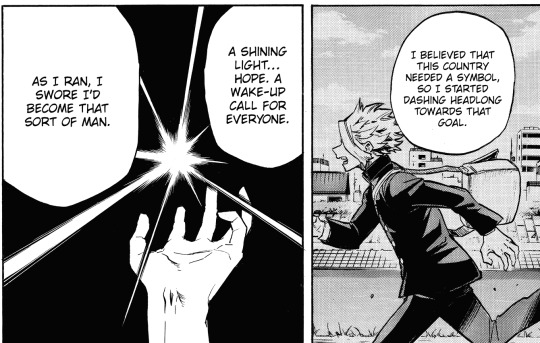
He does have a lot of difficulty initiating personal conversations: it takes him far too long to reveal important backstory info like the origin of OFA, and he had a lot of trouble reconnecting with people like Gran Torino and Nighteye. But this seems like a reluctance to open up, not an inability to choose. He’s always been a secretive person who would rather not talk about himself and who would prefer to conceal facts if it helps create a more positive and uplifting atmosphere. With most other situations, he could honestly benefit from a bit more indecision before impulsively leaping into things.
Mindsets: Lack of pleasure
This one is obviously subjective. We can’t exactly ask him, and the whole premise that kicked off this examination is the idea that he’s faking a smile to hide his fear and pain. But even so, it is really difficult to look at things like the first minute of episode 58 and conclude that he’s not having a genuinely great time.
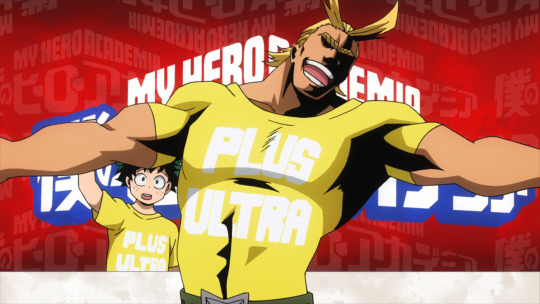
I can’t know for certain, but I am pretty sure that he doesn’t ham it up like this because he’s grudgingly going along with what his media team ordered. I am pretty sure he made a lot of his career and branding choices because he just thought they were really fun and wanted an excuse to burst into rooms while dabbing and shouting corny catchphrases. He doesn’t need to be a huge, ridiculous goof, but he seems to love it, both in hero and in true form.
There’s a frequent idea that the only reason Toshinori works so diligently for so long, and acts so enthusiastic in his hero form, is not because it brings him happiness, but because he’s driven by workaholism. He has to be “on” 24/7 in front of others. If he stopped, or dropped his cheery facade, he would feel crushing guilt for letting down the image he’s supposed to uphold. Therefore: it isn’t that he feels happiness or pleasure from his work like it appears—he doesn’t, he’s desperately depressed and burned-out—he’s just even more desperately trying to avoid shame. There’s no joy in the excessive act he puts on.
There is no question that he’s a workaholic. Multiple characters tell him this to his face. When he talks about why he became a hero, he usually phrases it as feeling driven in some way, rather than “it’s just so nice and enjoyable to save people.” Other people refer to his drive as a “madness.” And throughout the whole story, he struggles with feelings that he’s not doing enough, despite going above and beyond pretty much constantly.
He has stated, several times, that his work is not easy. It’s not all smiles. In fact, it can be crushing, something he mentions in chapter 317.

But does this mean he has gotten no enjoyment from his hero persona? That it was never anything but a horrible slogging trap of obligation and guilt? That seems absurd. It disrespects his compassion and the earnestness of his heroic motives. Are we really supposed to believe that he gets no happiness from reuniting families after a disaster? No warm satisfaction from a job well done, or joy from inspiring people? Not even a smidge of pride from being fawned over? It’s a very hard job, but who’s to say it isn’t worth it?

In the end, we don’t have direct narrative proof either way. He does not look at the camera and tell us, “I feel immense pleasure and fulfillment in my life.” But he also does not say, “I am drowning in sorrow and nothing brings me joy.” To me, it seems most plausible that his drive to work is driven both by enjoyment and aversion... the same as most things in life. People have complex relationships with their jobs and goals. There’s no work in the world that is nonstop fun with no downsides.
Workaholism is definitely a red flag. But it cannot be used to determine someone’s mood or even their opinion of their work. You cannot assert “this person must feel no pleasure from their job” just because it’s hard and they would feel guilty if they quit. The person would need to show several other worrying patterns before this would become a plausible idea. And meanwhile, I think there’s quite a few signs that he experiences genuine happiness on the regular.
Mindsets: Excessive guilt/regret

Toshinori has the tendency to apologize for things that are not his fault. He is the classic overreaching hero, taking the weight of the world on his shoulders. Some examples:
Both after the Stain arc and after Shigaraki ambushes Izuku at the mall, he apologizes that he wasn’t there to protect Izuku.
After the Summer Forest Training incident, he is mortified that he was blissfully taking a bath while his students struggled for their lives.
He apologizes to Aizawa when Katsuki picks a fight with Izuku, saying that he should’ve been more sensitive to Katsuki’s mental state. No, Katsuki’s just feral.
He apologizes that he wasn’t able to be more helpful to Izuku in the Villain Hunt arc. Yeah, because Izuku ditched him!
This seems like a natural consequence of his grand hero goals and the overpowered Quirk he lived with for 40 years. It makes sense that, as his power wanes, he is going to have trouble letting go of his overinflated sense of responsibility. At the same time, he seems aware of this issue and knows that it’s unreasonable, shown when he comments in chapter 22 that he and Izuku are alike in their compulsion to personally apologize for everyone else’s problems.
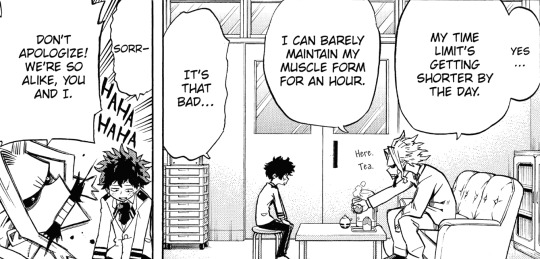
In addition... he is also just a polite Japanese guy, even if he steals Western superhero imagery left and right. In the U.S, this kind of behavior looks dysfunctional, but in Japan, it’s customary to politely apologize all the time for the most unnecessary things. The notes below come from a story draft that Horikoshi, this show’s mangaka, gave to his animation studio. These notes are an example of normal Japanese humility!

(Note that the finished OVA almost exactly followed this so-called "incoherent" script.)
Interestingly, despite this reflexive apologizing, he doesn’t seem to dwell on his failures for long. Excessive guilt and regret is all about rumination. Izuku is a great example of this, as he does it repeatedly, mulling over old topics and beating himself up after the fact.
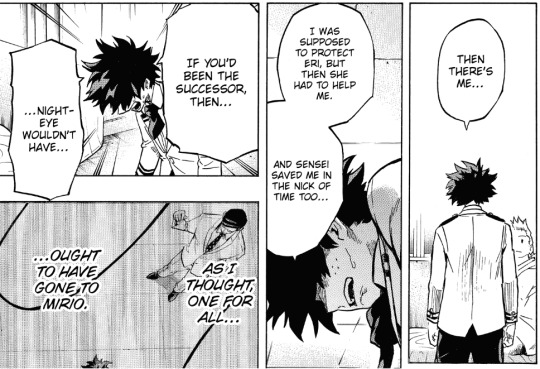
But Toshinori behaves very differently. He is forced to confront and deliver a lot of bad news over this series, but he usually handles it in a remarkably non-judgmental and matter-of-fact way. And then, we almost never see him revisit it in order to berate himself. Examples:
At the USJ, he says “I’m sorry, Aizawa,” when seeing the awful injuries he could have prevented if he had been there... and that is the last we hear about it. We don’t ever see him bring up the incident again to fret about how he should have been there or done better. Instead, he brags about how Class 1-A did a stellar job and how the villains picked the wrong fight. (Positive reframing, again!)
When he learns about All For One being alive again, he’s naturally upset... but we don’t see him berating himself for failing to do the job right the first time. He has a lot to be guilty for: Izuku now has to face the horror he couldn’t defeat. But he doesn’t really get down on himself for it.
When he learns about Shigaraki being Nana’s grandson, he is naturally horrified. He tries, later, to take on the task of saving Shigaraki. But Gran Torino and Tsukauchi immediately shoot down his idea and tell him it’s not his task. He still does what he can to help the war effort, but I don’t recall him revisiting this topic to ruminate over his failure to save his master’s grandchild.
When asking Inko’s permission to let Izuku keep going to U.A., he spends very little time begging forgiveness. He immediately turns it around and asks her to... think on the bright side of things, and imagine the good instead of ruminating on the bad.
Nighteye is one of the few exceptions. When Toshinori speaks with Endeavor shortly after Nighteye’s death, it’s clear that he still feels regret about the way he cut Nighteye off so long ago. Nighteye also haunts his thoughts later... which I’ll get to.
Interestingly, I believe the story strongly suggests that he ruminates and apologizes too little, and that this is a character flaw. For example, in episode 5, after the entrance exam, when Izuku asks him whether he knew One For All was going to shatter all his bones, Toshinori doesn’t berate himself for causing his student horrific pain. Instead, he replies with... a thumbs-up, a big grin, and a lame pun.

In fact, unless I’m forgetting, he has never apologized to Izuku for his harsh speech on the rooftop, for all the bone-breaking, for failing to defeat AFO the first time, for withholding vital information, or for generally doing a terrible job as a mentor. There are many, many fix-it fics out there that are clearly frustrated about this behavior. It has taken him over 300 chapters to begin to self-reflect and realize the folly in this. As of this writing (chapter 360) he still hasn’t gotten around to giving his successor a proper apology that actually addresses his real failings, instead of a generic “sorry I couldn’t save the day.”
So he apologizes for things he shouldn’t, and doesn’t apologize for things that he should. Flawed? Yes. But overall pretty low on the guilt and regret.
The tally so far
Lack of energy/motivation: none we can see. He is on the go constantly.
Isolation: none we can see. He seems to prefer work over idle socializing, but it would be hard to expect much else from the #1 hero.
Other physical symptoms: none we can see.
Negativity/catastrophizing: pretty much none, impressive considering this series is a giant string of disasters. He is practical with bad news and practices positive reframing all the time.
Indecisiveness/reluctance to act: he is extremely decisive, almost too much so.
Lack of pleasure: subjective, but he seems to have plenty of genuine fun.
Guilt/regrets: apologizes for stuff he shouldn’t, but does not dwell on things. In fact, his refusal to self-reflect on his mistakes could be considered a flaw.
This is why I bothered to make this post at all. The depression take has always fascinated me because from what I can see, it’s not just that it’s debatable: it’s that most of his behaviors seem like the polar opposite of what you’d normally see in a person suffering from depression.
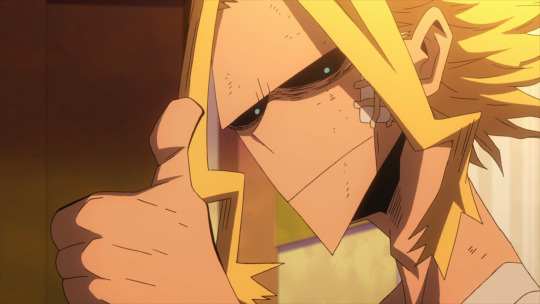
I am not trying to say that he is perfectly well-adjusted and has absolutely no problems. He is a clear workaholic and has dangerously skewed opinions about his limits and his sense of responsibility. He is extremely reluctant to open up about personal topics and tends to hold people at a distance. He does not self-reflect on things he should—this could be a sign that he dissociates from his flaws instead of facing them. All I’m saying is that these problems do not seem to involve depression as it’s normally understood.
But I’ve left out an important scene, one of the most decisive in this entire discussion.
Fighting Fate
This scene, starting in chapter 130, is considered proof positive that Toshinori had pretty much given up on life, at least before he met Izuku. Because Toshinori straight-out admits that, when Nighteye told him that he was going to die, he went right ahead and accepted it.
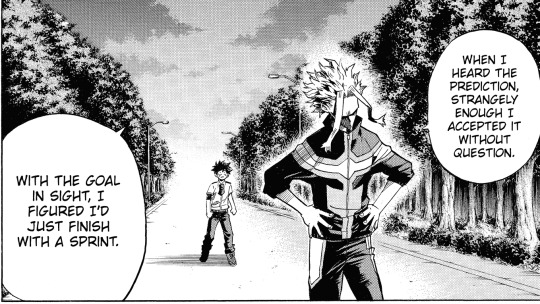
What kind of person would just roll over and accept death? Only someone who’s lost all hope, right?
You may be anticipating a rebuttal. Good instincts.
Think back to the hospital scene where this prophecy happened. Toshinori had just experienced a devastating injury, something he would never truly recover from. Considering his usual invulnerability, it was also, most likely, the first time he’d ever been badly injured in the line of duty. Imagine how terrifying and bleak life must have felt, constantly wondering whether he’d die suddenly and uncontrollably at any instant from the thousands of complications that can come from losing so many vital organs. He decided to use whatever remaining time he had left to uphold his duties as the Symbol of Peace, at least until a successor could be found to take his place.

But then... Nighteye informed him that he was, essentially, guaranteed to survive for an entire six or seven more years. And not only that... he would die while facing off against a villain, which presumably meant he could do hero work during that time. That had to be incredible news for someone who didn’t know whether his remaining life was going to be measured in years, or weeks, or days, or hours. It must have been an enormous relief. And it’s no wonder he skipped right out the hospital doors, if he had been promised he would survive for years to come no matter what. I mean, why wouldn’t you fight as much crime as you could if you had the guarantee that you would never die for at least half a decade?
To me, his behavior perfectly aligns with the attitudes we’ve seen in the previous sections. He knew, better than almost anyone, how infallible Nighteye’s prophecies were. So he didn’t dwell on the unfairness of it or hesitantly spin his wheels while pining for a rosier solution. He just immediately chose to make the best of what he was given. To me, that doesn’t look like depression or hopelessness at all: that looks like a remarkably proactive, pragmatic approach to one’s inevitable mortality. (It also looks like raging workaholism to try and go back to work while still barely able to walk, but nobody’s perfect, and again: I think this driven behavior fits workaholism way better than it fits depression.)
In the real world, if somebody got a terminal diagnosis with a fixed time frame like this, Nighteye’s desperate bargaining (“We’ll change things! Somehow! In some unspecified way!”) would be considered the dysfunctional attitude, while All Might’s resolution to get on with his life would be the well-adjusted, healthy one. His only “flaw” was that he didn’t idealistically assume he could escape the inevitable just by really, really wanting it to happen.
But luckily, Izuku came along to remind him that he lives in a superhero comic. And so, when he reached his finish line... he rose up, sent his optimistic streak into overdrive, and refused to accept his fate.

To me, this fight was astonishing. Because depression is crushing. Depression is exhausting. The urge to lie down and give up is overwhelmingly powerful. Even if you can push past it in order to do your duty, it’s always still there, weighing you down, whispering in the back of your mind.
But we got to listen to the thoughts inside his head during this fight, and we didn’t hear those whispers, not for a moment. He never wistfully said goodbye to the relief of that finish line, or mused that it would have been nice for his pain to finally be over. He never complained that his responsibilities were too heavy. He didn’t push back those negative thoughts—because they weren’t even there in the first place. Instead, his mind was filled with thoughts of his loved ones and the duty that gives him purpose. He ignored AFO’s taunts, pushed aside the awful shock of learning about Tenko, and chose to defeat his destiny.
How My Hero Academia handles hidden emotions
(Spoilers ahead for anime-only watchers)
You may be saying at this point, “This nitpicking is pointless. We heard him say that he smiles to cover up the pain. So of course we wouldn’t see symptoms. Clearly, he’s just stoically hiding his suffering. He has no energy, but he makes himself get up in the morning. He consciously pushes aside the dark thoughts and chooses to be uplifting. He doesn’t complain because he needs to set a good example.”
You may also be saying, “This is unfair. You’ve barely said a word about the Aizawa bench scene or the Stain confrontation in any of your examples.” That’s right! I’m going to get to those now.
One thing I learned pretty quickly is that this show is not coy about telling us when a character is having trouble, even if they are trying to hide it. When Ida was trying to “show a strong face” during the Stain arc, his attempts to hide his distress in chapters 45 and 46 were about as subtle to the audience as a sack of bricks.

We see this same pattern in many other characters. Here is an example from Izuku in chapter 163, putting on a brave face and claiming he’s fine. Note how the narration beats us over the head with the fact that he is not, in fact, fine.

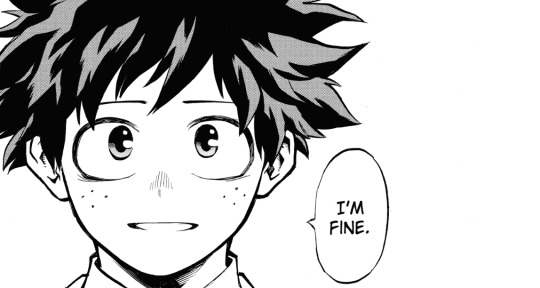
Endeavor and Hawks also come to mind as characters who put on a stoic face towards others. And yet, we are given inner thoughts and private moments where we see their true feelings. I’m pretty sure Bakugo is the one who’s been consistently the most mysterious about his true feelings, which is saying something. This show is not subtle overall.
Initially, when we didn’t see this happening with Toshinori, I thought that he was just being Plus Ultra once again. His whole arc is about hiding the truth of himself, right? So of course he’d hide his exhaustion and pain from the successor he’s trying to inspire. He doesn’t want to inconvenience others, or draw attention to his own problems. He must be so good at deflecting concern that he can even hide it from the narration!
But then, the series continued, and... suddenly, we started getting the same blatant signs that we got from every other character. We were shown, very plainly, that he was struggling with feelings of being unable to help like he once could. As soon as Aizawa asked him what was wrong in episode 113, he plainly stated, “I am struggling with feelings of being unable to help people like I once could.”

What? He just casually blurts out his troubles to a coworker the second they question him? What happened to “put on a smile at all costs”? What happened to stoically hiding his sadness no matter what, to the point that there’s no evidence he’s sad at all?
As the stability of the nation crumbles and things get worse and worse and worse, he gets less and less subtle. He starts dwelling on his past failures, thinking about Nighteye over and over, and berating himself for his shortcomings. He tries his best to keep his turmoil hidden, and for the most part, it’s kept private from other characters. But we see it clear as day. We are clearly shown tons of blaring depression warning signs: feelings of worthlessness, lack of motivation, rumination, guilt, indecisiveness, hopelessness.

At the climax of it all in chapter 326, he goes wandering off dramatically in the rain (subtle!!) and freely discusses his negative thoughts during a truly wild serial killer therapy session.
We, the audience, are very clearly shown every step of his pain. And after he’s processed through it for a while, he leaps with both feet back into proactive, positive action, doggedly contributing to the war effort, the same energetic behavior he shows during the entire rest of the show. He’s definitely shaken, and may very well still be dealing with persistent negative thoughts (“crawling through the mud,”) but his spirit is not broken, and he’s pushing forward as best he can.
Will he backslide after this? Who knows; the manga isn’t done yet as of this writing. But it sure looks like a typical character crisis/resolution arc. He went through a harrowing time of self-doubt, and by chapter 327, came back out of it with renewed determination to help and faith in his students and in the future.

So what gives? This certainly looks more like a classic depressive episode than anything we’ve seen thus far. All in all, it comes off remarkably similar to the way that pretty much every other character’s emotional troubles are handled: blatantly. And he picks himself back up really fast.
Some might say that he was always secretly depressed, and only opened up to Aizawa because the stress was just too much and he broke down. But I argue, again—My Hero Academia tells us when its characters are experiencing emotions, even if they conceal them from the rest of the cast. It makes no sense for Toshinori to be an exception.
For the first 250 chapters of the show, Toshinori does not show any signs of lethargy, excessive rumination, negativity, feelings of worthlessness, or other signs that typically accompany depression. We get plenty of glimpses into his private, inner thoughts during this time. We even get to watch him hiding his emotions! And, like almost every other instance of characters hiding their emotions (this example in chapter 59), his true feelings are crystal-clear to the audience. (He’s also not very subtle in general. Not really a master at concealing his distress.)
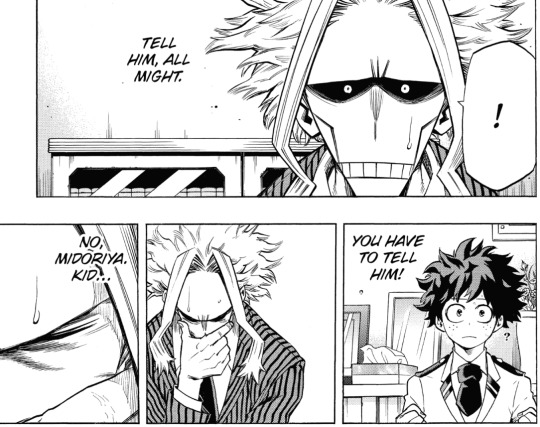
Then, we get a character arc where he does display all those depression warning flags, very clearly and straightforwardly, in much the same way that the show portrays other characters trying to deal with mental distress. So what does that mean for the beginning of the show, when we never saw anything like that?
The clearest explanation of all this, to me... is that Toshinori has never been playing 5-D chess with the narrative. What we saw is what he felt. We can now tell that he was never cleverly trying to bluster through depressive attitudes back then, because we now know what it actually looks like when he’s trying to bluster through depressive attitudes. His remarkable ability to act like someone who does not have a mood disorder makes much more sense if he does not, in fact, have a mood disorder.
Except for one thing... the rooftop scene that started all of this.
What was going on there? If he never had depression, why did the show start off with such a wild red herring? Why have him announce that he was hiding horrible, crushing anguish, then turn around and make him act perfectly normal for the vast majority of the show?
Heading back to the rooftop
This gets into very speculative territory. But please hear it out, and decide if it makes more sense than secret-depression-with-no-symptoms. To me, the key is to look at the whole rooftop scene in context.
Let’s think about it from Toshinori’s point of view. He’s just been accosted by, from what he can tell, a rabid fanboy with no sense of boundaries. He has no idea how important Izuku’s dream is, and Izuku doesn’t exactly sell his ambition very well.

Izuku is a skinny, timid little string bean who clearly hasn’t trained for a day in his life. He describes saving people as... “cool.” And now he’s blithely asking if it’s possible to become a hero on All Might’s level without a Quirk. To Toshinori, Izuku probably looks like just another head-in-the-clouds, delusional fanboy. (There’s plenty of room to argue that this was exactly Izuku’s mindset until Toshinori dropped opportunity into his lap. He did not seem to actually try very hard, he just had a lot of vague dreams and a notebook blog. But that’s for another discussion.)
Toshinori probably encounters dozens of kids who act just like Izuku every day: kids with no sense of perspective, who look at heroes and thoughtlessly go “that looks cool, I wanna do that.” After all, earlier in the chapter, every single kid in Izuku’s class seemed to be planning a hero career, including the kids with amazing powers such as “has a long neck” and “has puffy cheeks.” Good luck with that, kids.
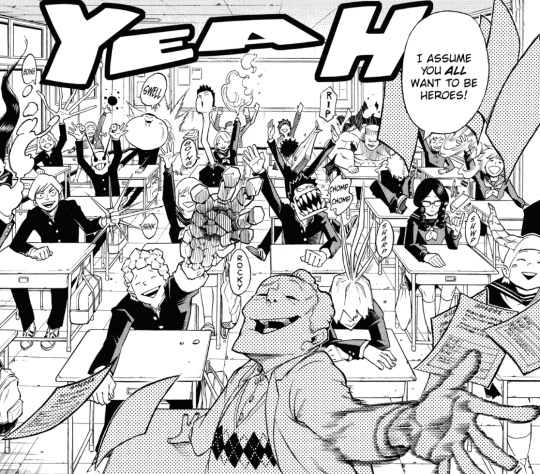
I wouldn’t be surprised if All Might’s example specifically causes problems with expectations: he makes everything look fun and effortless, easily saving everyone with a smile, so young fans make unrealistic assumptions about what hero work is actually like. Long-neck kid is going to get a horribly rude awakening when he realizes how traumatic the profession can be and how unsuited his Quirk is for the job. It’s got to hurt Toshinori, knowing that he’s inadvertently setting up innocent children for this kind of shock and disillusionment. And now, he’s seeing those unrealistic assumptions play out in this youngster, who’s already reckless enough to do dangerous things like grab his leg when he’s about to launch into the air with the speed of a jet plane.
It’s probably hard to talk kids out of this idealistic mindset. But because Izuku has seen his true form, Toshinori suddenly has a lot of options available that he usually doesn’t. The cat is already out of the bag, so now he can use the reality of his situation to give this kid the biggest wake-up call possible. Hence showing him the scar. Hence talking about his smile.
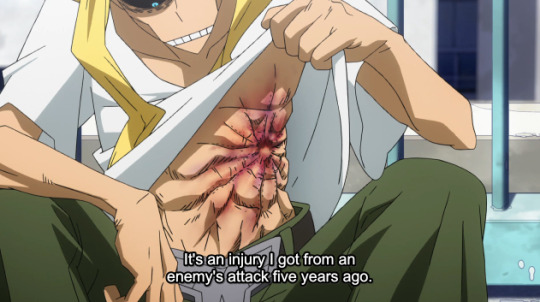
My takeaway is: when he talked about his smile hiding his fear, I now don’t think Toshinori was trying to make some kind of deep personal admission about how he has to conceal his true feelings. It wasn’t really about his feelings at all. It was simply about trying to convey a sense of reality to Izuku. “Look, I don’t smile because this job is effortless, even though I make it look easy. In reality, hero work is difficult and frightening. Please understand the gravity of what you’re trying to get into. Even I haven’t come out unscathed.”
He’s been through hell. His job is much harder than it looks. But I don’t think he’s trying to tell a child he just met that he’s secretly depressed and living a double life. Despite the struggles he’s been through, his positivity, drive, and hope are genuine, and we see that clearly throughout the entire rest of the show. He just doesn’t want this poor kid to get the wrong idea about hero work.
I hope all this was able to demonstrate why, nowadays, I don’t think he was suffering chronic depression during this series. Now, before the series? We can’t know. I’m sure that he was devastated after Nana’s death, and had a nightmarish time trying to adjust to the reality of his injury. But over a long period of time? I seriously question whether he would have been able to accomplish the superhuman career that he did while juggling a chronic mood disorder—to me, it belittles the debilitating nature of this condition to claim, “well, he pushed past all the hampering symptoms just by being so driven and noble.”
We saw him go through a crisis in the war arc, and he is likely still dealing with that internally. To me, the fact that he picked himself back up so fast just makes it even more unlikely that he has been quietly buckling under a long-term mood disorder this whole time. I don’t think he was hiding crushing, overwhelming negative feelings and putting on a brave face, because this series shows us whenever characters—including him—do things like that. He’s had a hard life, and he has plenty of problems, but I don’t think that this mood disorder has been one of them.
But why doesn’t he have depression!?
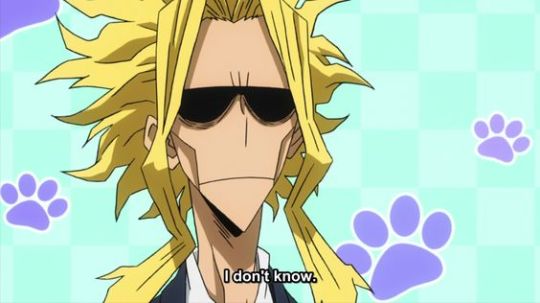
More than the rooftop, more than anything else, I think one of the biggest reasons people headcanon Toshinori as having depression &/or PTSD is simply because they take one look at his laundry list of tragedies and go: “there’s no way in hell a person wouldn’t be messed up after all that.”
And... yeah. That’s a very reasonable point.
In fact, I’d take it even farther: every single person in this show should probably be more traumatized than they actually are. Class 1-A? They should all be on a first-name basis with their therapists by now, with everything they’ve been through. And yet, canonically, they don’t show significant signs of trauma. They process their hardships and then go on to do things like their schoolwork and coordinated dance routines.

This is where we have to accept that this is a shonen series. The poor author is caught between a rock and a hard place. On the one hand, it’s implausible and lazy to just ignore the entire topic of mental trauma, especially with a cast full of children who are experiencing violent crimes firsthand. But realistically depicted mental illness requires huge amounts of time and care to properly address, and characters with mental illness tend to have trouble doing protagonist-y things, like running off to save the world. If the story were to give the cast “realistic” levels of trauma, then the plot would instantly grind to a halt, dragged down by the severe psychiatric problems of 20 teenagers.
What’s interesting is that the series doesn’t just pretend the issue doesn’t exist. During the rescue OVA that takes place directly after the horrific events of USJ, Aizawa tells Toshinori that he shouldn’t throw a random villain surprise into their training exercise because it might be traumatizing.
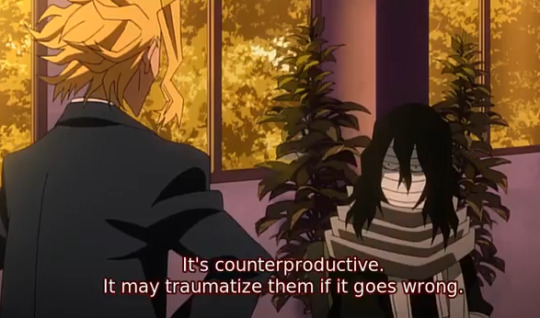
(But then they go ahead and do it anyway.)
Later, after the villain attack of the Forest Training Camp Arc, Nezu specifically says in chapter 86 that the kids received psychological evaluations.

So the show clearly indicates it’s aware of the risks... it just decides that the main characters miraculously happen to be super-resilient. Which seems implausible, and gets more and more implausible the longer the series lasts... but it’s not impossible. There are lots of factors that can have a protective effect against mental trauma, such as being a protagonist in a shonen series.
Honestly, I’d rather have this over-optimistic approach than have the story try to be “realistic.” Because, let’s be real, kids’ action-adventure shows usually can’t handle these issues tactfully. Just look at what happened when they tried to depict super-duper serious trauma with Eri. This poor girl had been tortured and abused for so long that she couldn’t even smile... but in episode 86, shoving her into a noisy, overwhelming concert magically rekindled her joy instead of, say, causing her to massacre half the student body in a panic attack. That’s just how these sorts of stories go... this show does not have the time or space to have her spend a decade in therapy like she probably needs in order to handle an event like this.
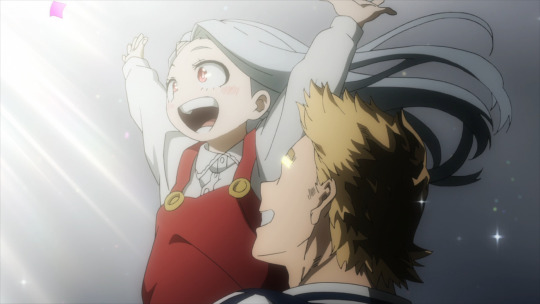
(But gosh, look how cute it is.)
Same thing with Toshinori. Should he have more medical symptoms than we see? Probably, but it would drag down the story. And if the show actually gave him chronic PTSD, then Japan would have likely become a smoking crater a long time ago. In my opinion, the only way he could canonically have PTSD and still keep the story moving is if he just so happened to have a conveniently neutered version of the disorder that never caused any meaningful trouble... and that’s pretty disrespectful to a serious real-life illness. I can get why the author might have looked at this dilemma and decided to avoid giving him PTSD at all. Not out of ignorance, but out of respect and a desire not to misrepresent the condition.
This is exactly why fanworks are so useful: because they aren’t constrained by the many limitations of the main story. They can look at what it might be like if Eri actually needed a decade in therapy. They can see what might happen if Toshinori completely fell apart, or accidentally hurt someone in a moment of panic.
However... please think about the kind of message it sends to say, “Well, obviously, he should have depression/PTSD. He would definitely have them if this weren’t a shonen series. I’m doing honor to his true character to give him these conditions.” Losing a loved one does not automatically doom a person to trauma disorders or mood disorders that persist 40 years after the event. Injuries, even terrible ones, do not automatically doom a person to trauma disorders or mood disorders either. It is horribly bleak to make these claims like they’re givens.
It is also so, so saddening to see so many assumptions that his career as the Symbol of Peace came at the cost of his happiness, or that he lacked purpose or meaning in his life before meeting Izuku. It feels like such a disservice to his heroic spirit and his desire to make a difference in the world. It must have felt so good, so incredibly fulfilling, to be able to help so many people and raise so many spirits, even for a few hours a day. Who wouldn’t feel satisfaction from being able to play such an amazing role? Notice how we only started to see the negative thoughts really creep in once he lost his hero form for good.
He doesn’t need to have suffered through his whole career for his relationship with Izuku to be life-changing. In fact, I think it is much more meaningful if he felt true happiness from his career before starting to teach. Imagine the pain of losing something so important, so joyful, so immensely fulfilling, your life’s work. It would take something equally special and meaningful to fill that deep void and pull him out of the despair we saw in the war arc.

I wasn’t born yesterday; I know that fanfic exists to let us gleefully torture our favorite characters as much as we feel like. Sometimes, at the end of the day, you just gotta give them a debilitating mental disorder. But I question the constant message that optimism and good deeds are worth more if they’re forced out past a pall of suffering. Sometimes, it’s nice to be reminded that people can go through hell and still come out smiling... a genuine smile, not hiding a thing.
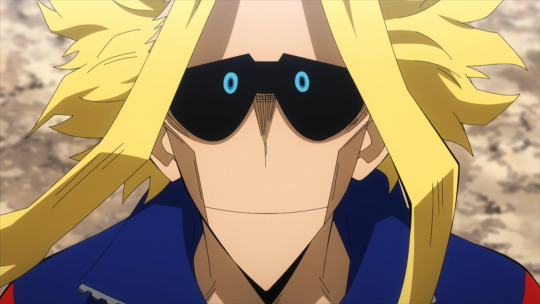
(Thanks to @journalxxx for lots of help and input on this post)
179 notes
·
View notes
Text
now that i’ve had time to come to terms w the fact that the weird headspace i get into sometimes due to very predictable triggers is actually called “ptsd-related hyperarousal” and not a normal reaction to that stuff it has become... painfully obvious to me that jean vic has some kind of harry-related ptsd, it just gets expressed very differently to kim’s and never gets directly mentioned as far as i can tell (which does, sorta, leave me wondering if it was intentional, but that’s also ultimately a dumb question).
the way he handles himself when he talks to other people, especially when harry isn’t around, is just so different... the EdC checks where he’s at the station, when he visits Kim in hospital, the heterosexual life partners bit, he’s visibly a lot calmer in all of them. and during the tribunal, when he realises that kim is still there, he acts pretty embarrassed about his freakout. that seems... very relatable to me! i’m not normally the person i am when i’m mcfreakin losin it, and it’s incredibly humiliating to be seen like that. something about being in that situation, where he has to confront harry (who is his partner, and sort of outranks him, and to whom his career is inextricably tied, and who has a history of emotional outbursts himself) and say “hey, why the fuck are you doing this”, is a genuine trigger for this guy. which is consistent with the implication that this isn’t the first time something like this has happened, perhaps not harry losing his memory but certainly harry almost getting fired (there’s even a direct empathy check involving judit if you drink on the job again which outright states that he’s escaped consequences for that before). it’s just... something that jean has been avoiding confronting as much as possible, because doing that just sucks.
and i think it’s... in my view, something that straight up prevents jean from having a working relationship with harry again. it might be something he wants, but the reality of how his body reacts to harry and his issues is going to get in the way. and that really undermines the idea that the end of the game results in some kind of return to status quo, right? and i’ve made a post about that before, where there’s the assumption that harry has some kind of inertia when you let go of him, and that inertia might actually lead to him being unable to recognise that he has a problem with emotional regulation and there being a disaster right on the horizon that’s invisible to the player in certain runs. everything at the end of the game is weird and tenuous, from the political future of revachol to the personal lives of the characters. you don’t really get resolutions at the end, you just get to know why and how a few things happened. which is an interesting storytelling choice but this is now wildly off topic, this is a jeangst post. tl;dr jean get petey esdey.
#yeah ill put that in the tag#jean vicquemare#my meow meow. my blorboni.#the big guy i give all my problems to#he just like me fr u_u
144 notes
·
View notes
Note
Not necessarily expecting you to know the answer to this but maybe someone who follows you does if you don't, this is the only place I know of to ask about this or even talk about it.
Do you or anyone else know anything about physical signs of sexual arousal while triggered?
I'm having one hell of a rough day, very dissociated so can't really tell what's up with me, just feeling physically awful and full of dread and anxiety but the confounding thing is that it seems like I'm sexually aroused as well and it's quite distressing not knowing why that is. I know "hyperarousal" is a thing with PTSD but this seems a little too literal? 😅
Unless that actually is all there is to it in which case...I guess 🤷
Thank you for everything you do Circjerk ^^
Hey! Sorry for the wait, literally forgot this ask came in-
First off, I need you to know how much joy it gave us to be called CircJerk. We are the circle jerk. It is us. (It made us laugh a lot, thank you)
Second off: Gonna put the sexual stuff under a cut on this one for my sake lol. The rest are cringing at what I'm writing.
It's okay to be horny while triggered. Like, right outta the gates, that's fine. For us, when we're triggered, it actually happens a lot. We've made sense of it in that... well, we're going through a lot of emotions, lots of brain chemicals and things, and BOOM, the chemicals cause a physical reaction.
Furthermore, we've been conditioned to see dangerous shit as sexy. That person who sexually assaulted me didn't just up and DO it one day -- she built up to it with more and more dangerous non-consensual acts, until the final moment, which made it more normalized for me so I didn't realize what it was until it was too late. Now, when I see shit that's clearly assault, it triggers me, because it reminds me of her -- but I get horny too, because I was conditioned to see that are good and sexy times.
I don't personally know a name for this kind of thing. I'll be honest, I grew up incredibly sheltered, and it's led to a lot of lack of education on sex stuff. It's something I want to read more on, especially in regards to trauma. At the end of the day, though, it is absolutely not a moral thing, and it's just a fact of life. Many traumatized people get horny when they're triggered, for various reasons. It doesn't mean you like the trigger or are horny for the abuse you faced; it means your body did the mmmm sexy things because your body does weird shit sometimes.
If other people know stuff about this topic, please, chime in -- I think that would be super helpful, especially as my experiences are only mine.
6 notes
·
View notes
Note
?
I’ve been through a lot of csa and cocsa and now I have an amazing loving perfect girlfriend who understandably wants to be physically intimate. Frustratingly for myself, I keep getting triggered and I’m terrified of any physical intimacy most days (hugging, kissing, cuddling, and more sexual stuff). Rarely, I can cope with a hug or a kiss. I feel guilty, like I am depriving my girlfriend of what I owe her which is physical intimacy. I think she is getting frustrated as well. It’s not that I don’t want it or I am not physically attracted to her, I just get triggered incredibly easily and it sucks ass. Do I owe it to her? Do you think there is anything I can do to make it so my brain can be okay with intimacy?
Thanks for running this blog, it’s been really helpful for me and I am very grateful
Hello,
You do not owe anyone your body in any way. You do not have to touch her. It's perfectly reasonable to want to be physically close to a loved one, but you do not owe it to her. This is true of every kind of relationship; familial, romantic, sexual etc
people can have relationships without much physical intimacy if that is what is healthiest for the people in the relationship. It's all about communication! If people are incompatible because they have different needs when it comes to physical touch that's okay, it doesn't mean anyone is at fault.
Now talk as honestly as possible. That is the first place to start whenever there are situations where you are having issues in a relationship communicating about it is vital. let your partner know you are struggling with being triggered and dealing with trauma. Then you can work out how to move forward with your partner feeling loved and honoured and you are not being pushed towards interactions that are not healthy for you right now.
Now, as for healing moving forward start slow.
Until you can gain a felt sense of safety in your body this will continue to be hard. And that takes time, but it can happen! You can heal and be able to figure out what physical intimacy is something you want but are struggling with and if anything just isn't for you. Which will be fantastic.
Healing trauma can have many factors some things that can be good starts;
Learning about trauma and how it lives in the body. Psychoeducation can help with feeling more okay
Informational Article: Being Our Whole Selves Brain & Body
Informational Article: Define Trauma
Informational Article: Hyperarousal & Hypoarousal
Informational Article: Implicit Memories and Memory Systems
Diagnosis Primer: Post Traumatic Stress Disorder (PTSD)
Books Suggestions: The Body Keeps The Score by Bessel van der Kolk, Trauma and Memory: Brain and Body; in a Search for the Living Past by Peter Levine, Waking the Tiger: Healing Trauma: The innate capacity to transform overwhelming experiences by Peter Levine & Ann Fredrick
Another huge factor is starting to connect with and understand your emotions and thoughts.
Using writing, journaling, art or other forms of expression can be great! This can help us start to find a way to see our experiences outside of just spinning our minds. Having it out of us can feel great it can also help us see where we are. With journaling brain dumping can be good for people who don't have a history of journaling, this consists of just writing out whatever is coming into our mind. this can be full sentences or bullet points.
You can start to make art or write about things more specific to your trauma later but there is no rush. Putting words to where we are now is just as important.
Learning coping skills to handle symptoms and triggers throughout the day will also start to heal our nervous systems.
Coping Skills: Dealing With Body Memories
Coping Skills Masterposts: Panic Attacks, Flashbacks & Dissociation
Another factor in healing our nervous systems is utilizing physical activity to connect with our body and help to get out the traumatic energy.
Yoga (especially if you can find a trauma-informed yoga approach) is a very well-liked method
Some people like self-defence and/or martial arts as it helps make us feel in control and can get out that stored energy
Dance! From taking a class or just bopping around in your bedroom to your favourite song.
Walking or jogging can be really great! it's good for you in general but if you do it mindfully it can really help with grounding. It can also be helpful as it's a bilateral stimulative activity.
Learning boundaries during relationships can help with a felt sense of safety. Being able to say yes when you want it and now when you don't can be great in helping to not only have better relationships but actually build more trust.
Advice: Healthy Boundaries
Forming healthy emotional connections can also start to form healing relationships and a felt sense of safety. Working on open communication and forming emotional/psychological intimacy will help you figure out what you need physically.
There is of course more to go and there is no quick fix. But I truly believe you will feel more whole.
If you can access it therapy can also be great. Trauma-focused therapies (including but not limited to: Brain Spotting, EMDR, Sensorimotor Psychotherapy, Somatic Experiencing, and IFS) can really help move the process of healing forward. Basic things like DBT or CBT that have someone working with you who are trauma-informed can be helpful in coping and making deeper work more effective.
I do hope some of this is helpful,
Admin 1
#ask#advice#coping skills#resources#childhood trauma#trauma#CPTSD#triggers#ptsd#complex post traumatic stress disorder#complex ptsd#trauma recovery
8 notes
·
View notes